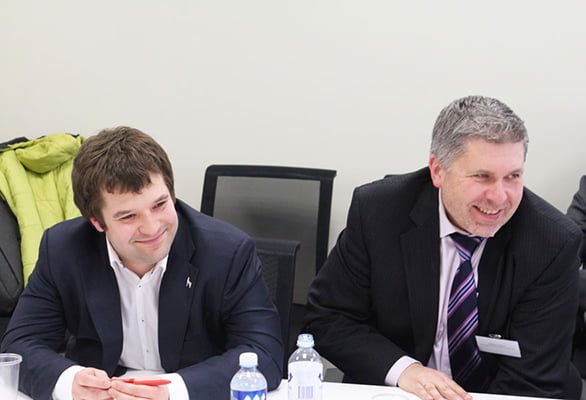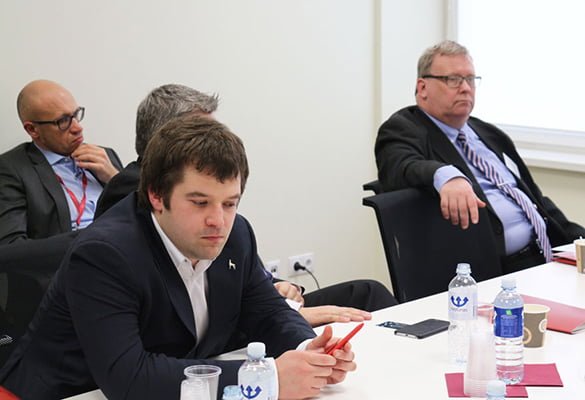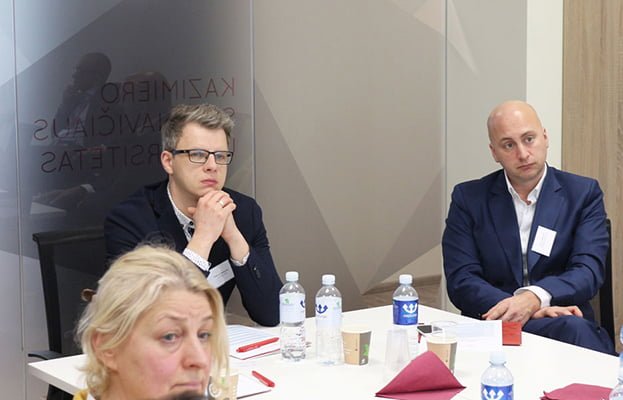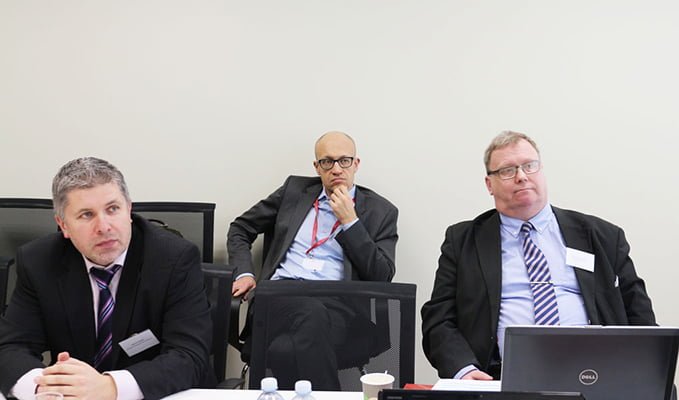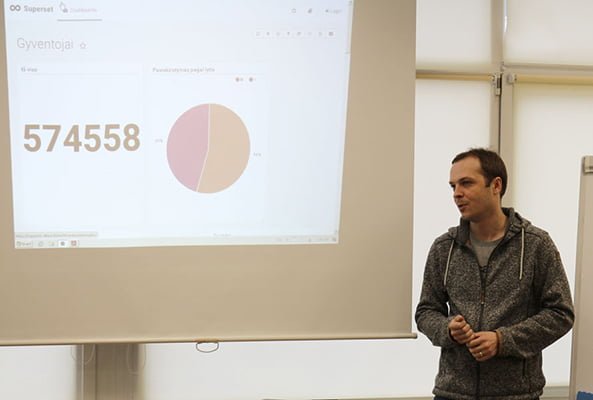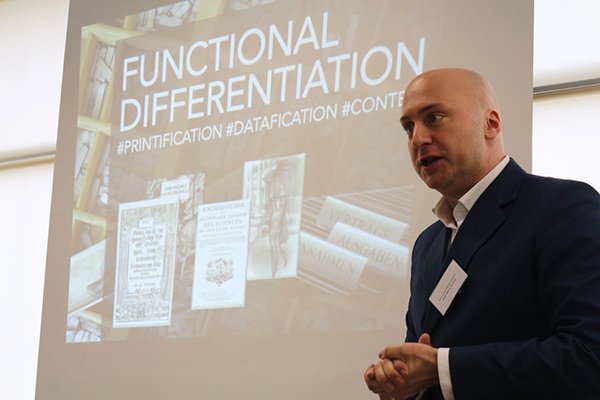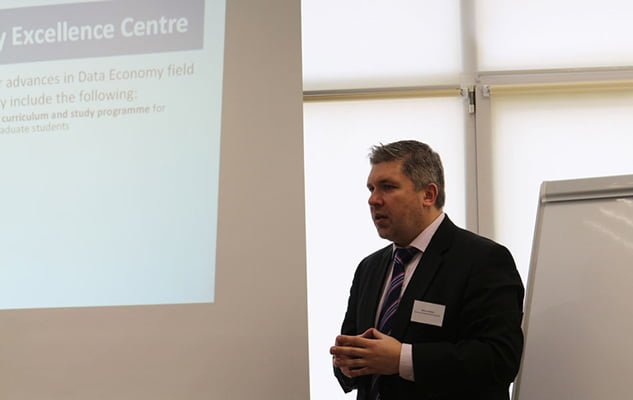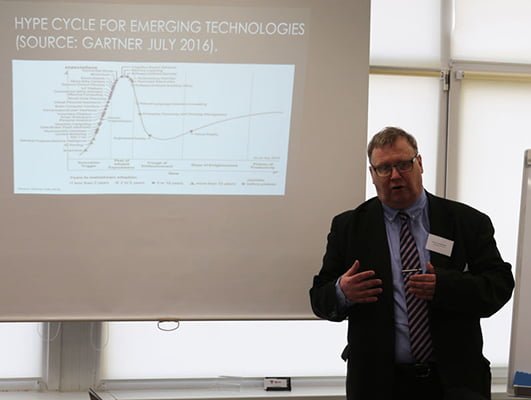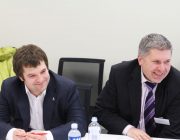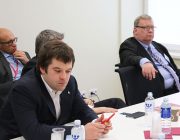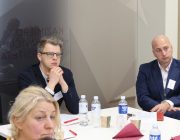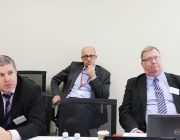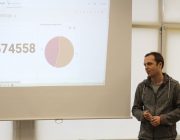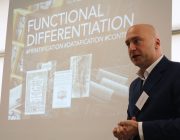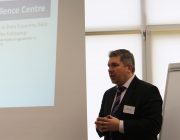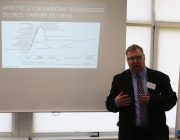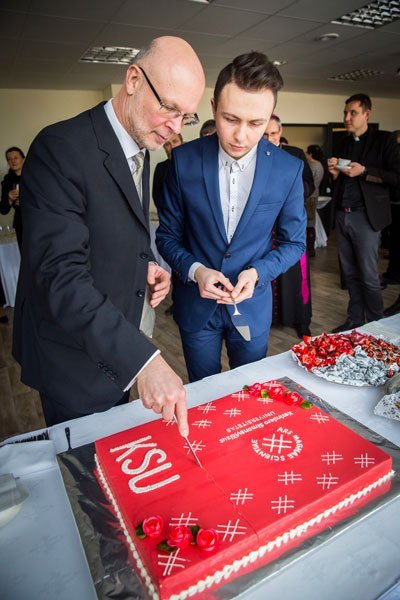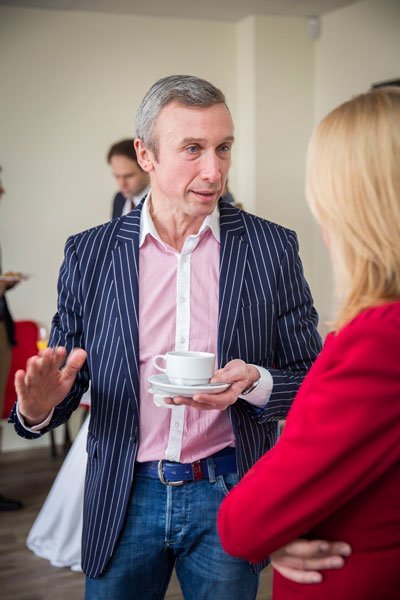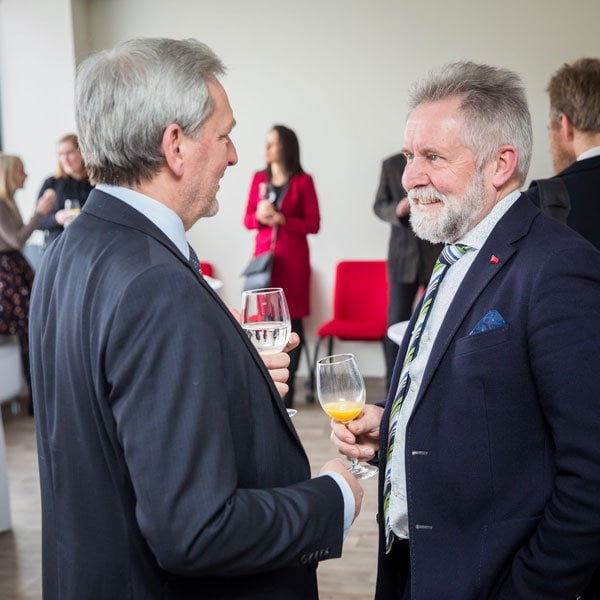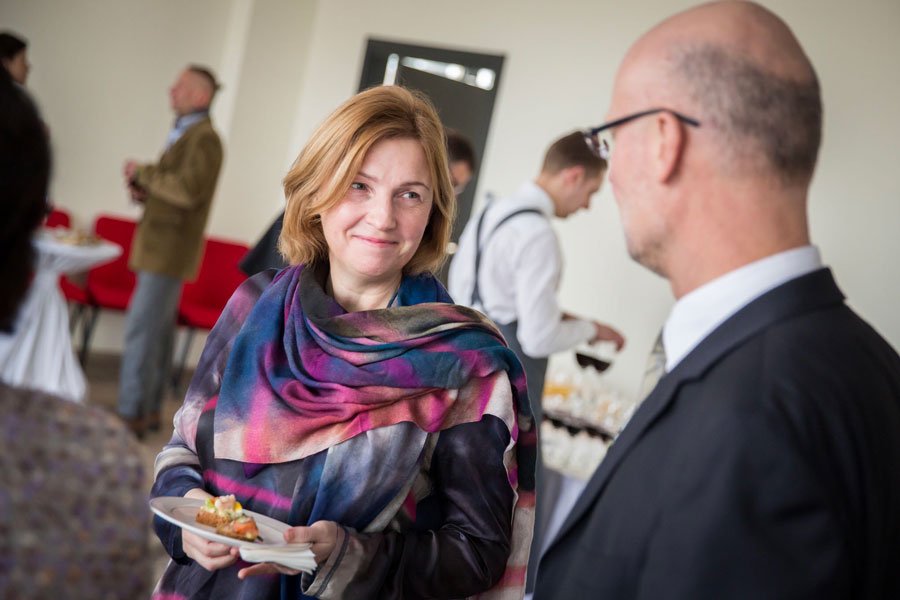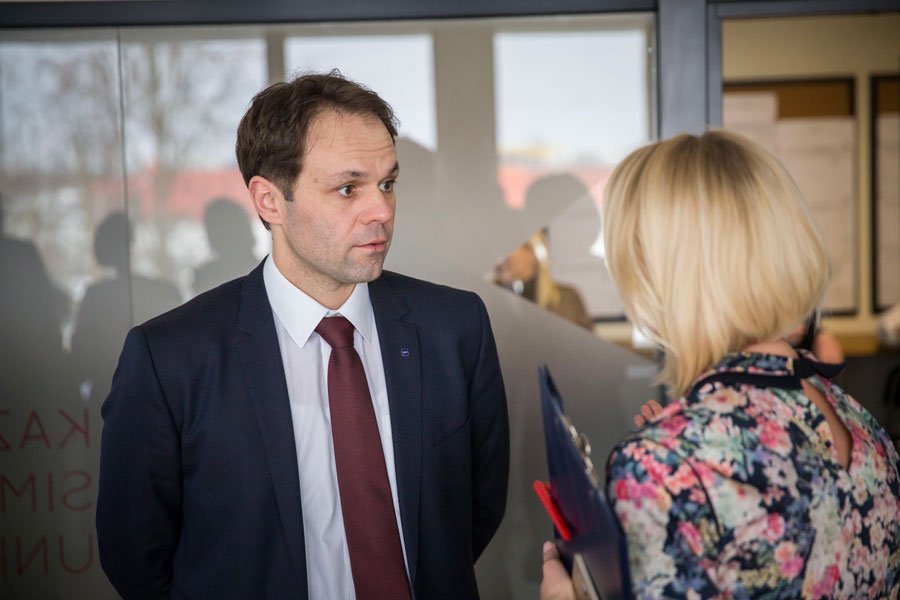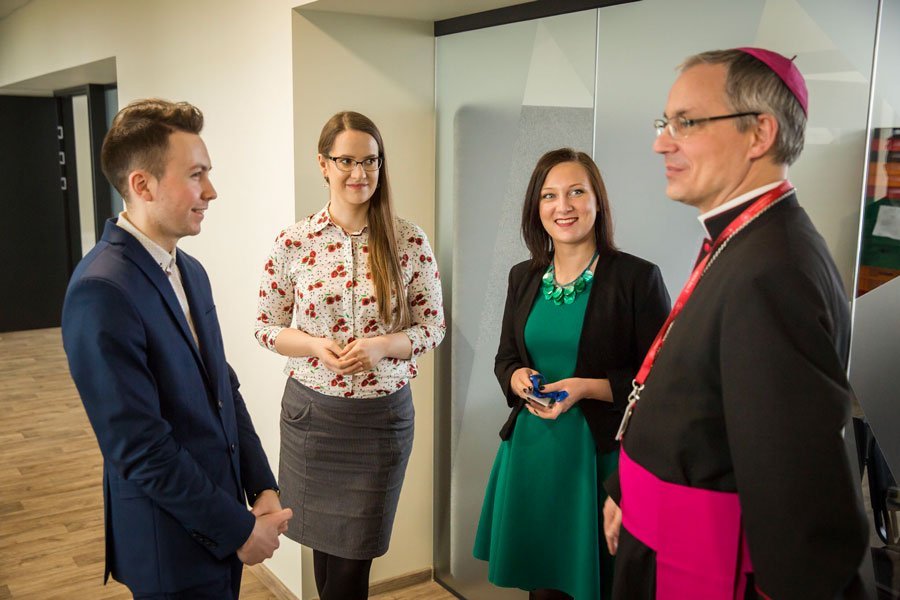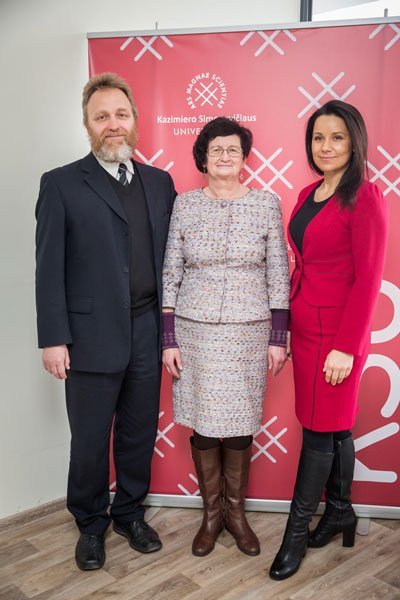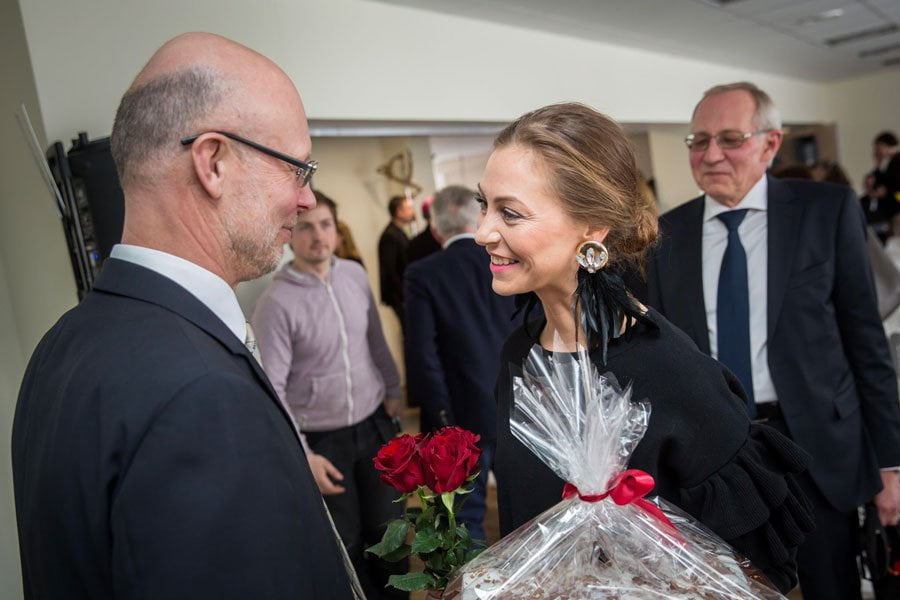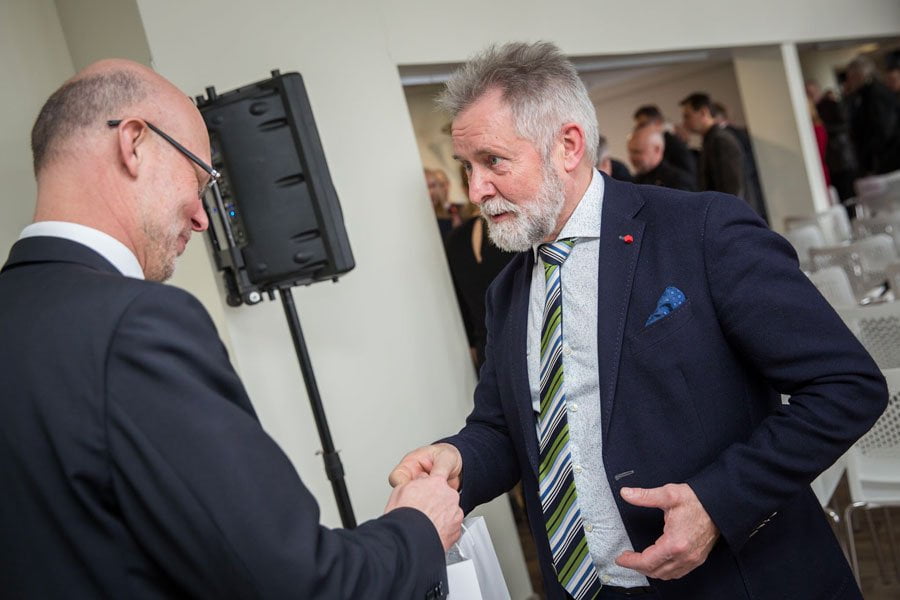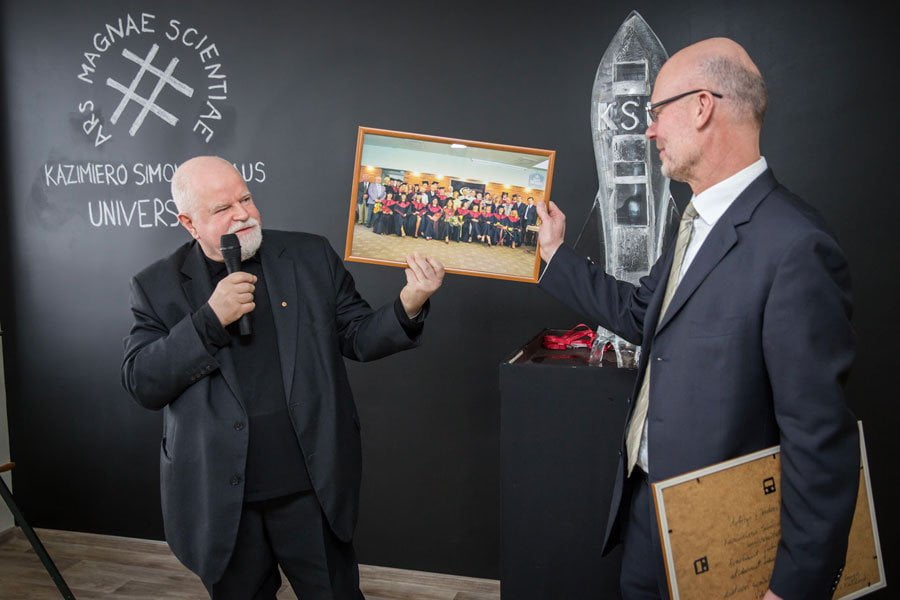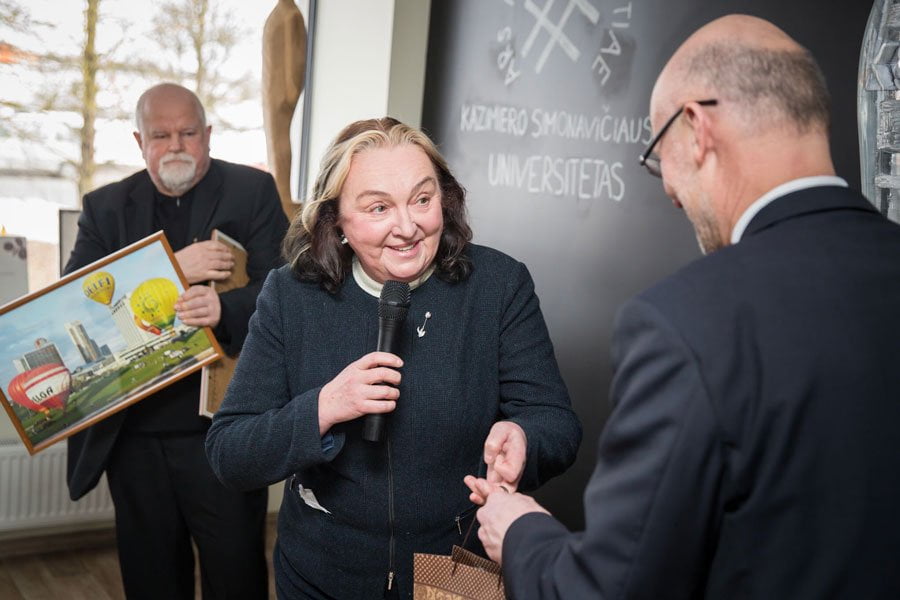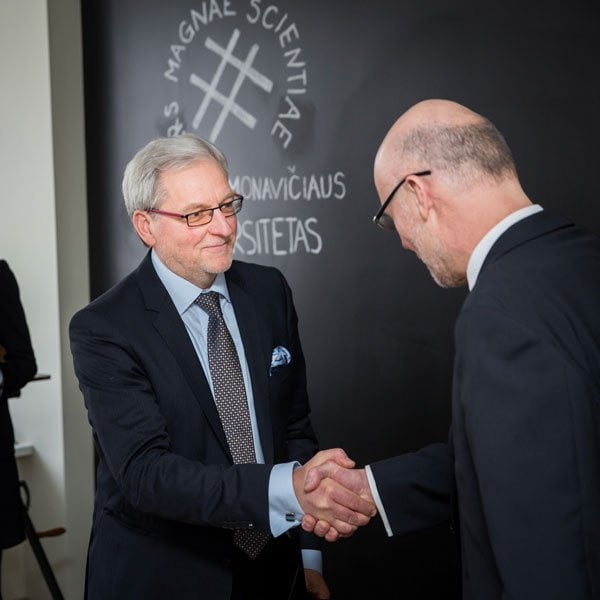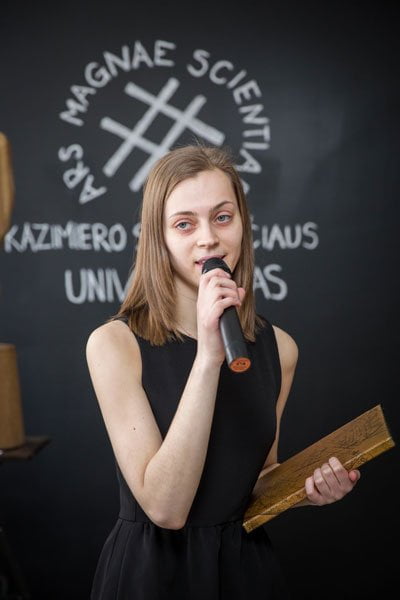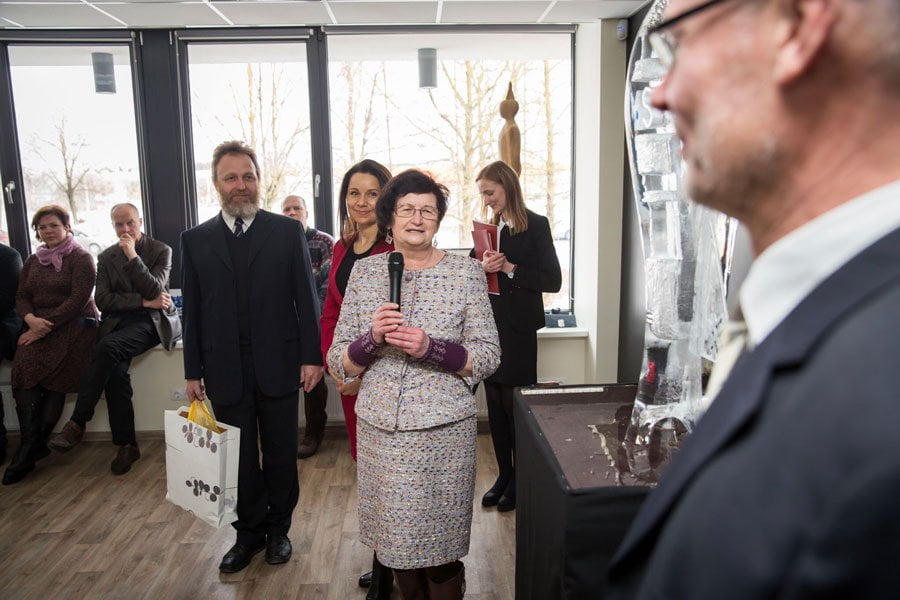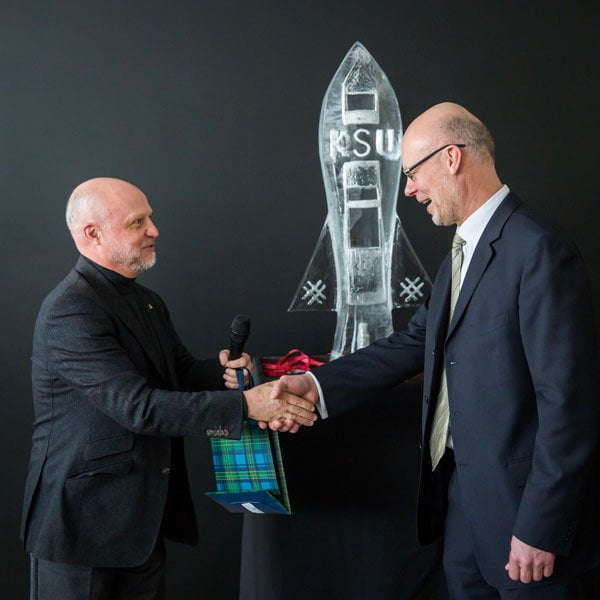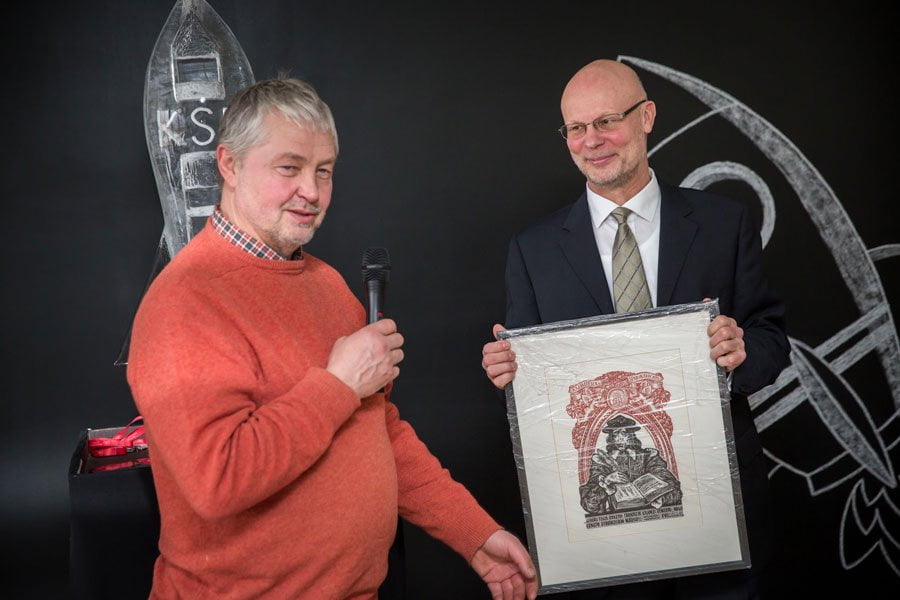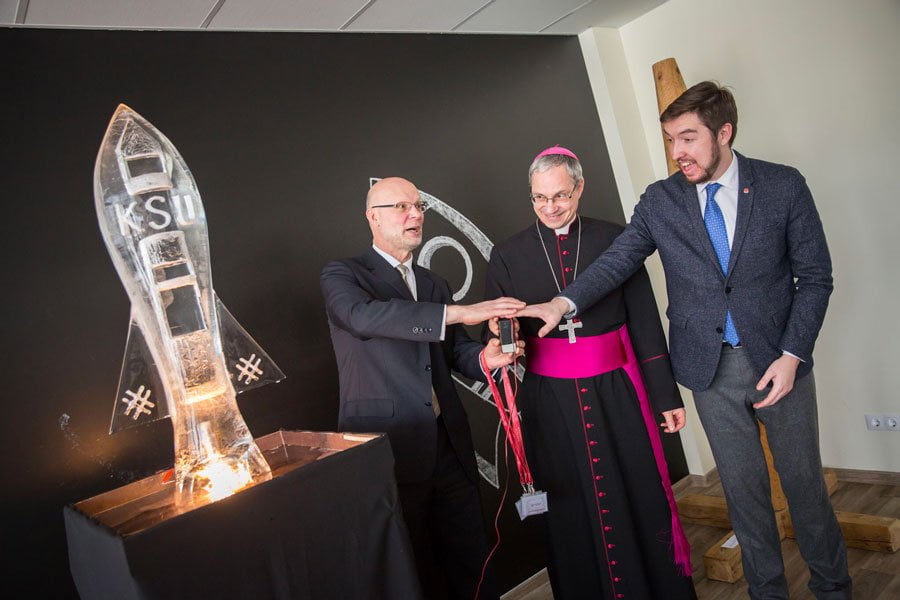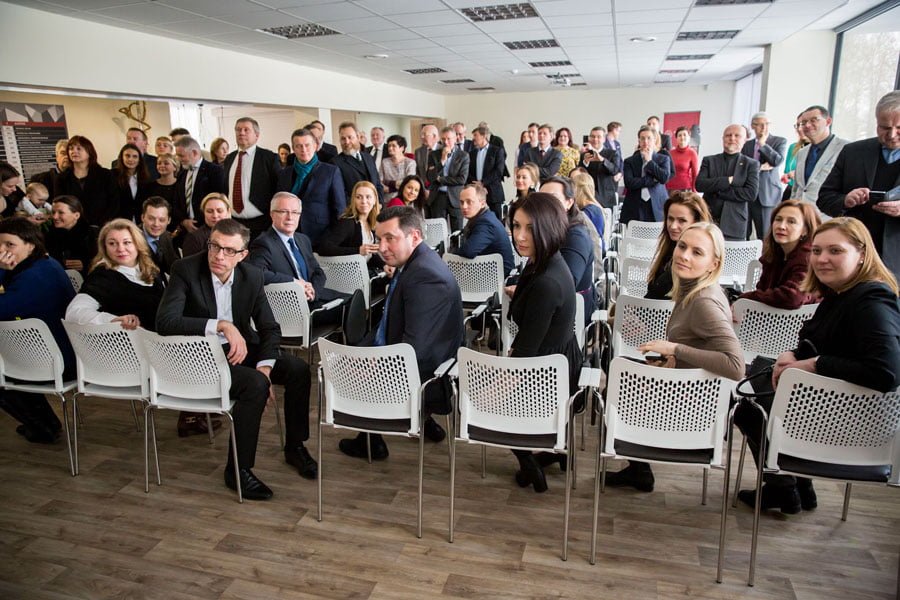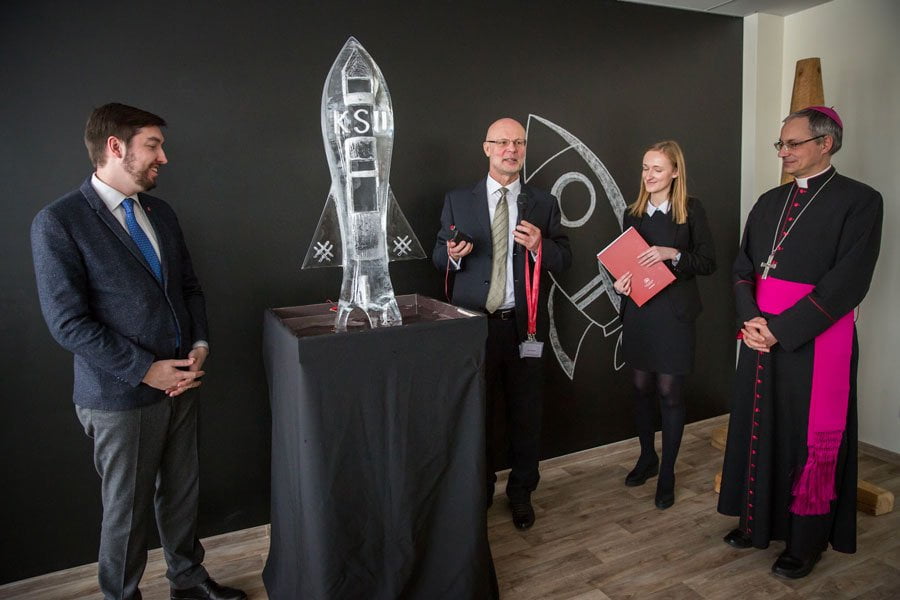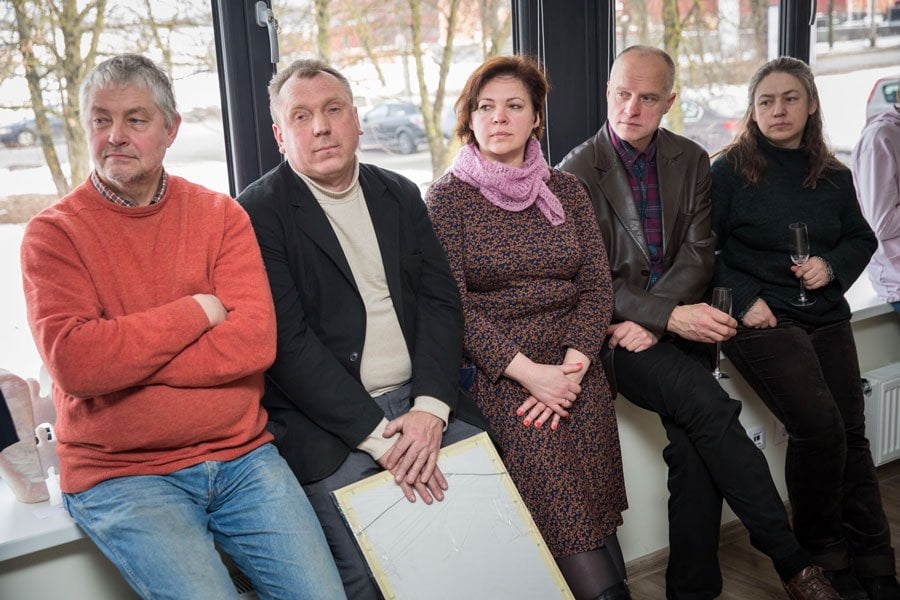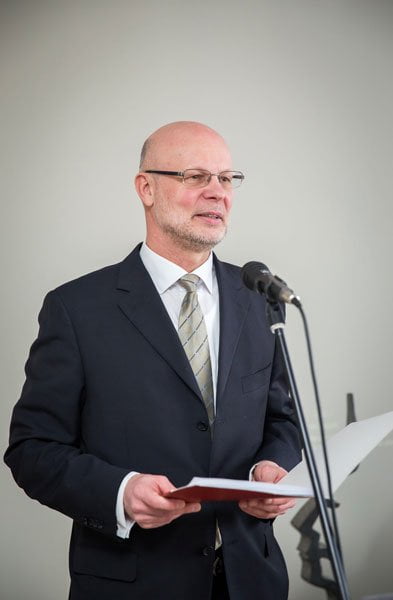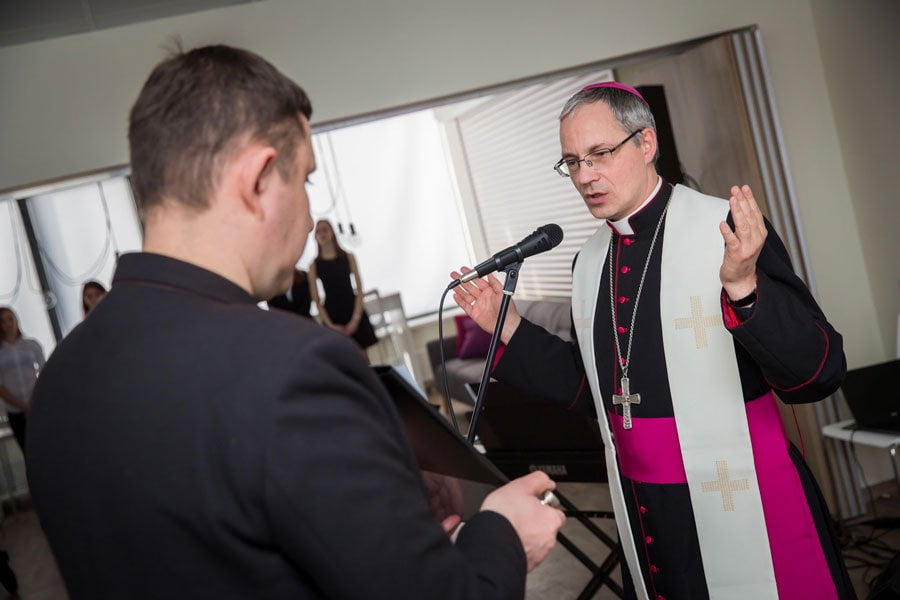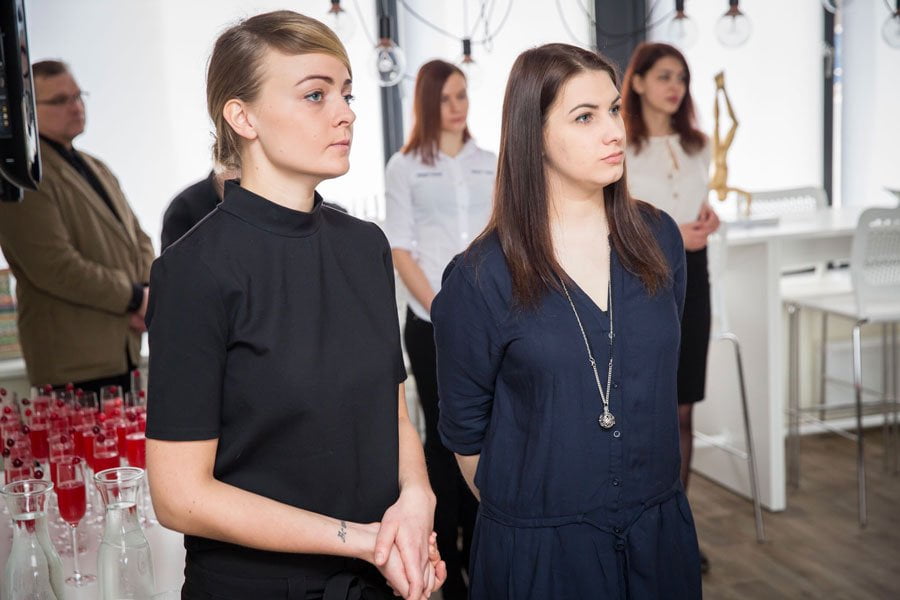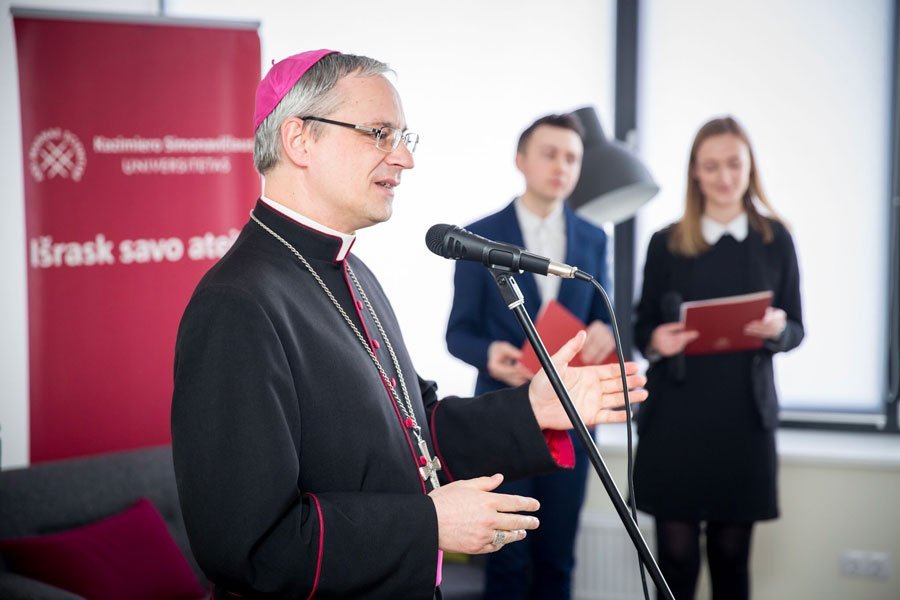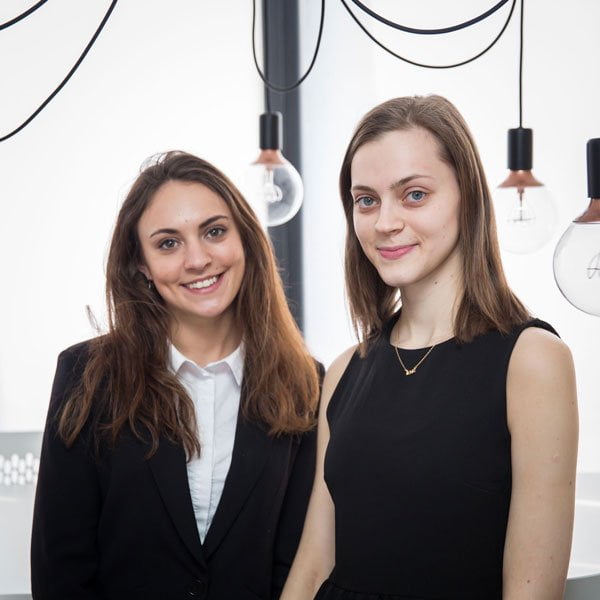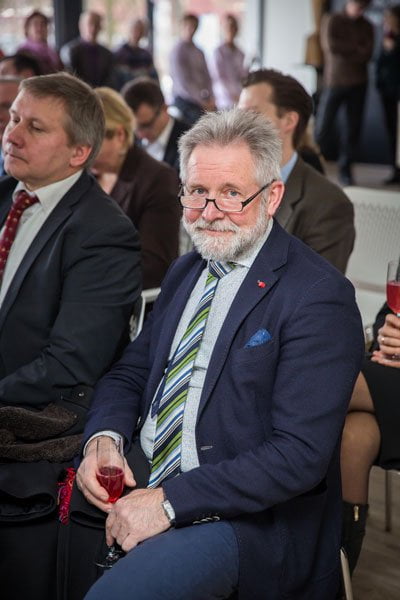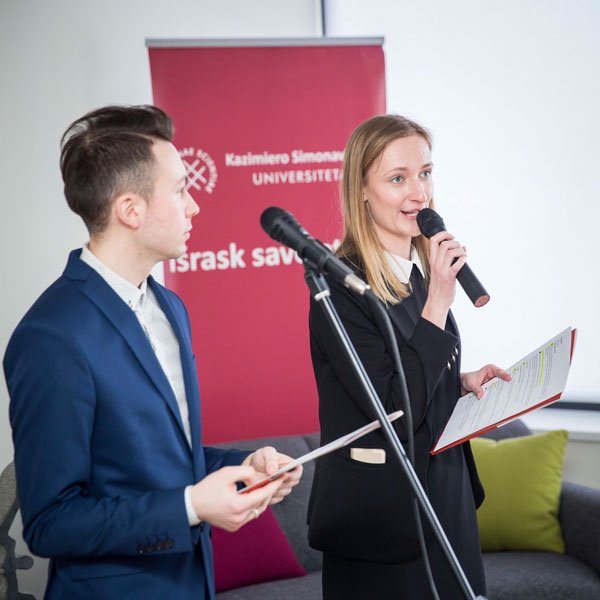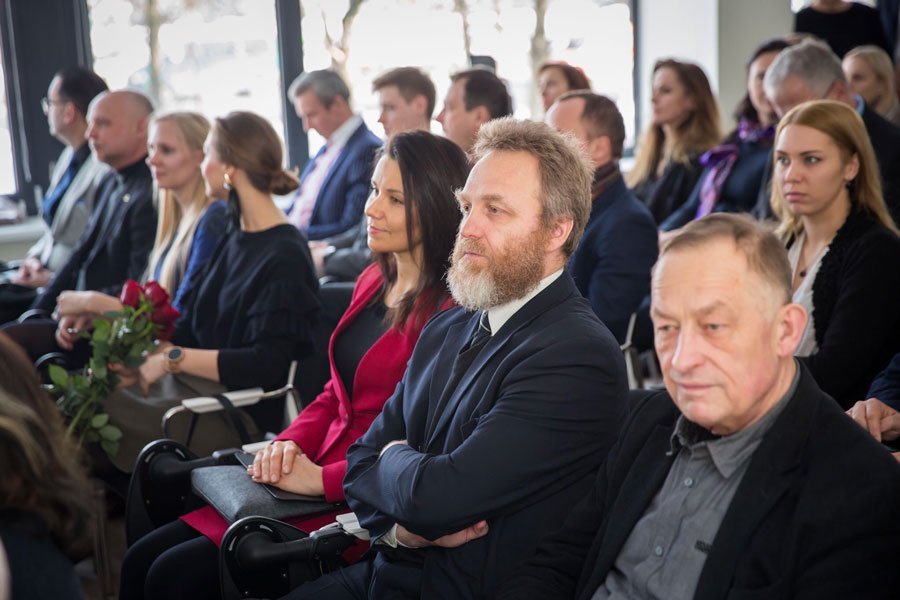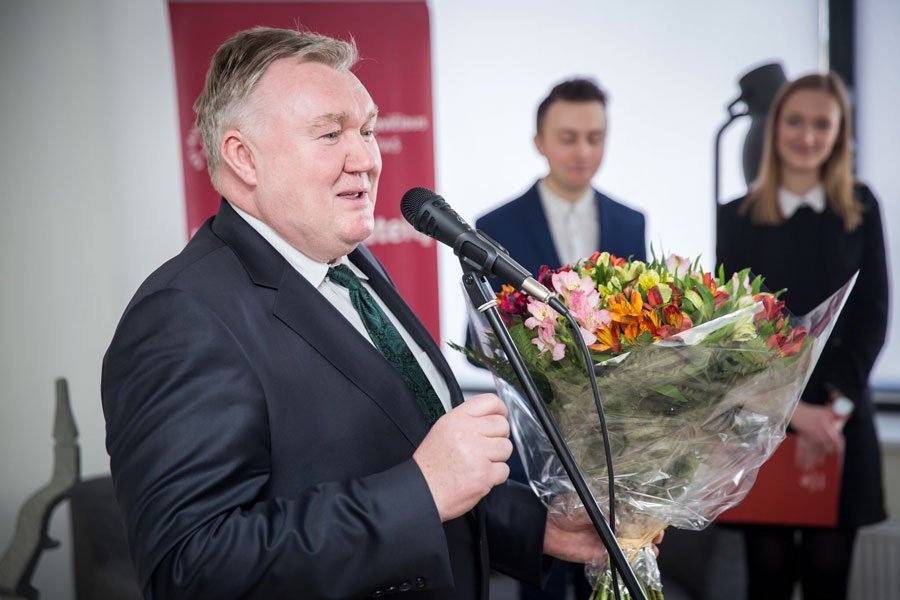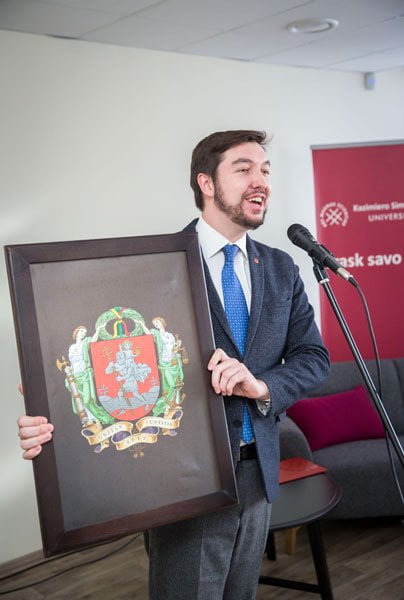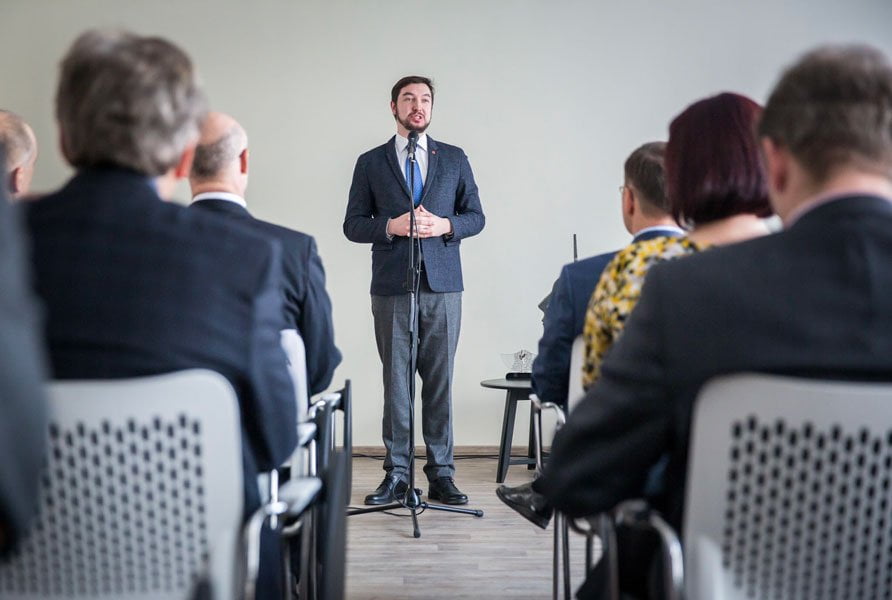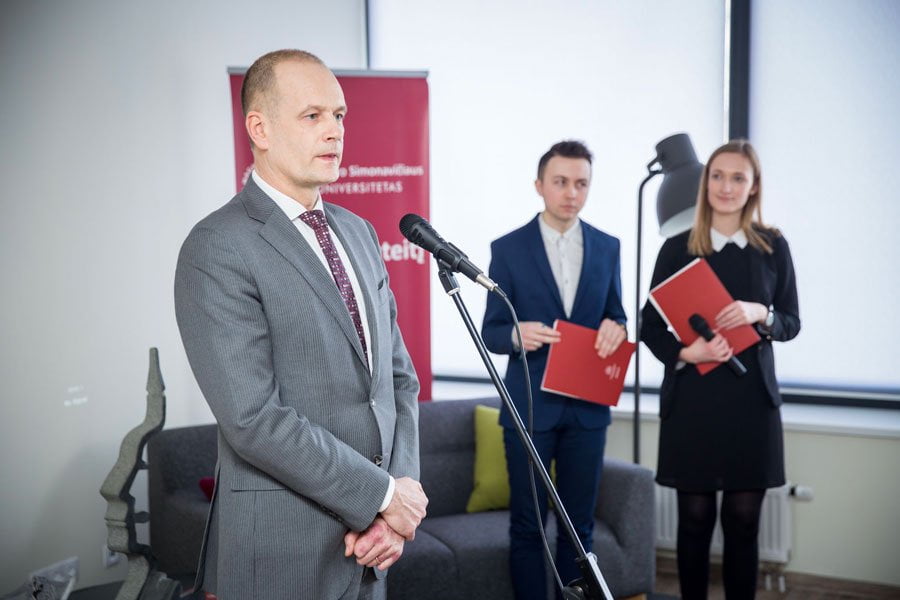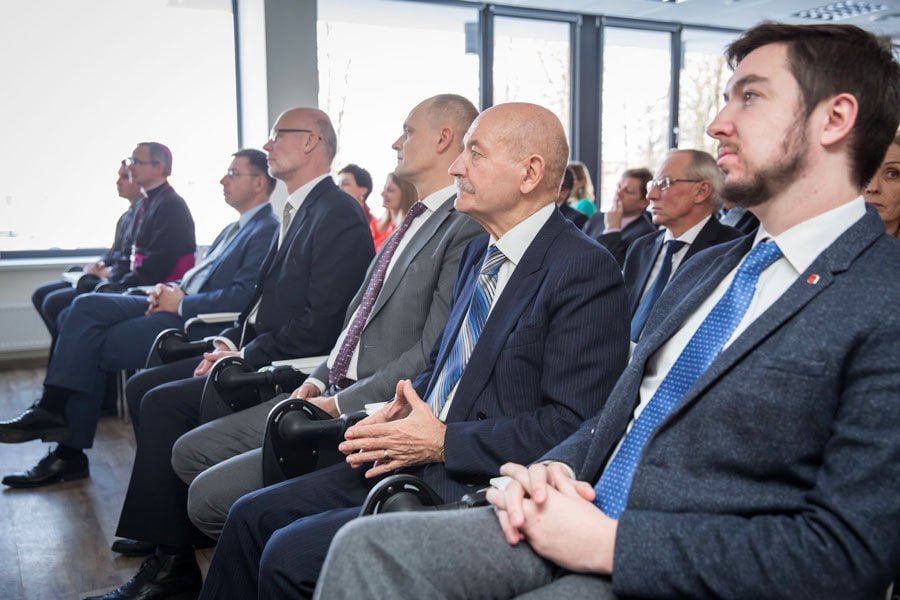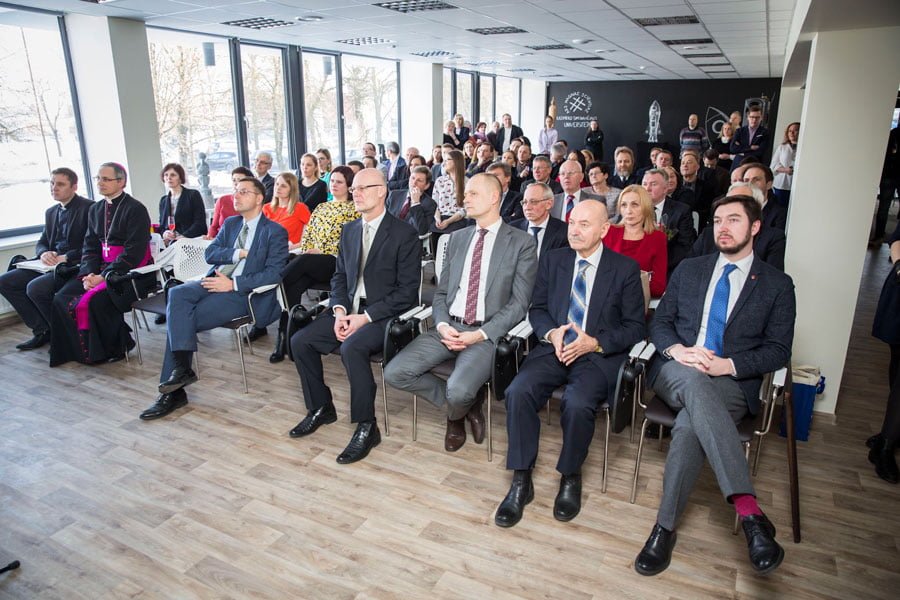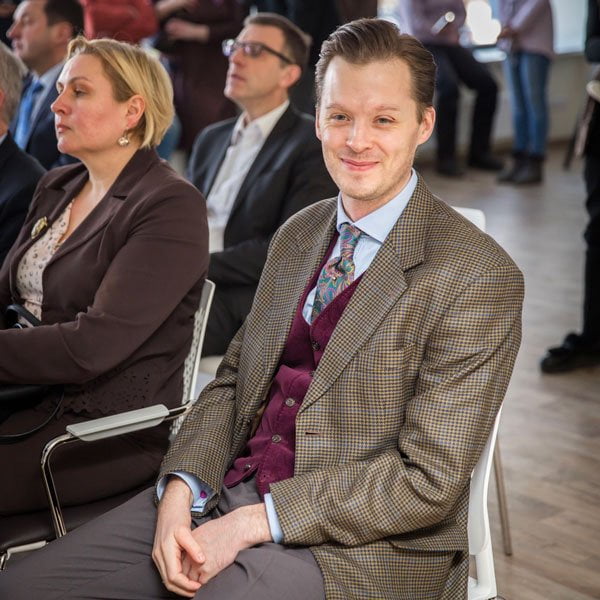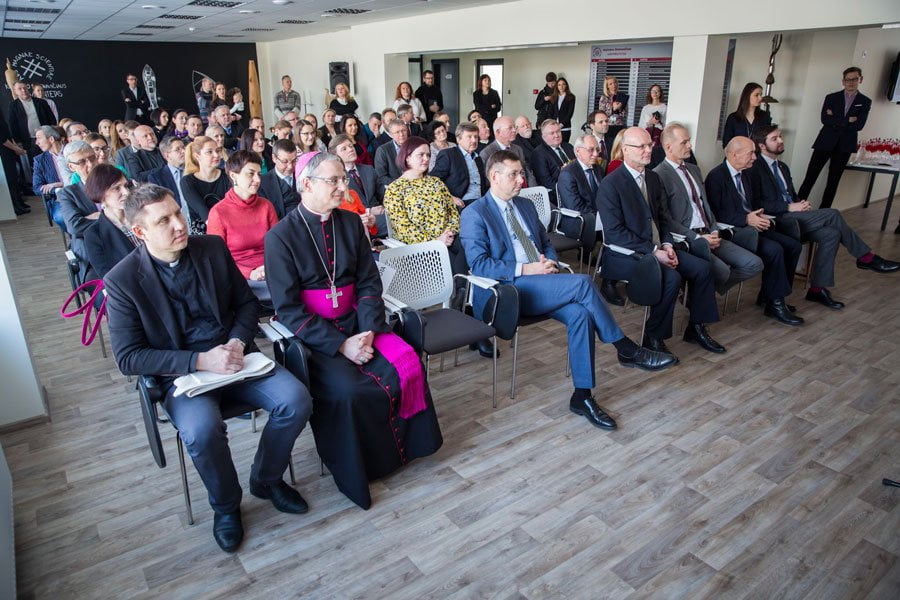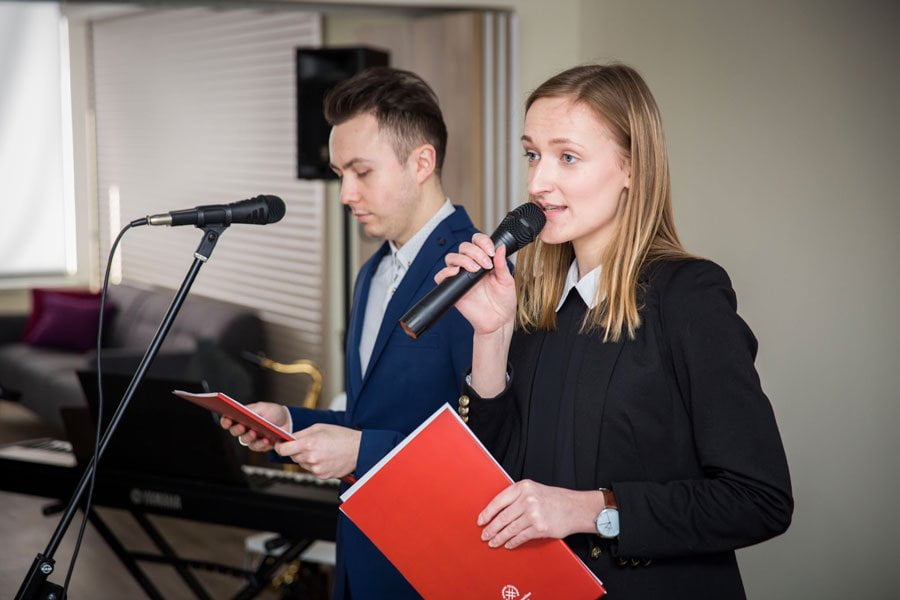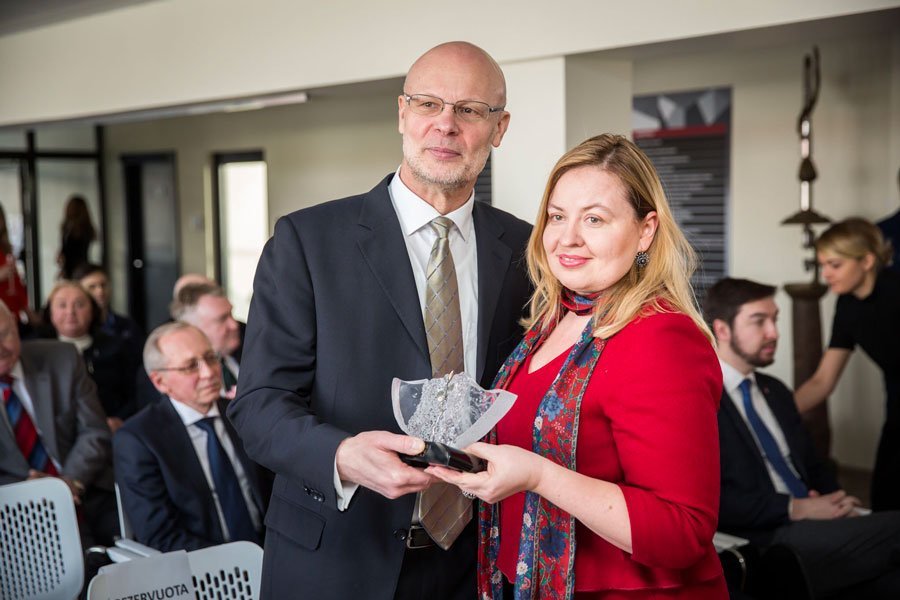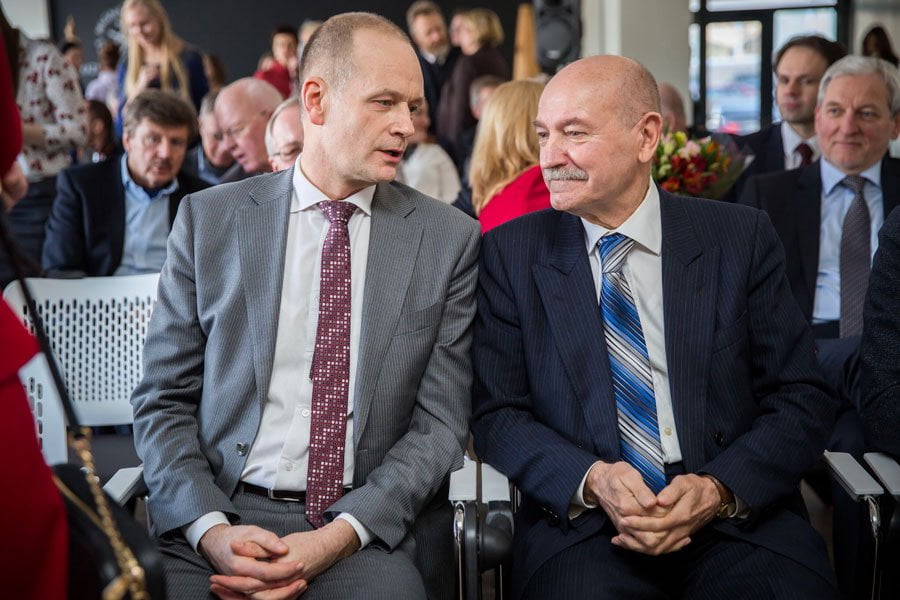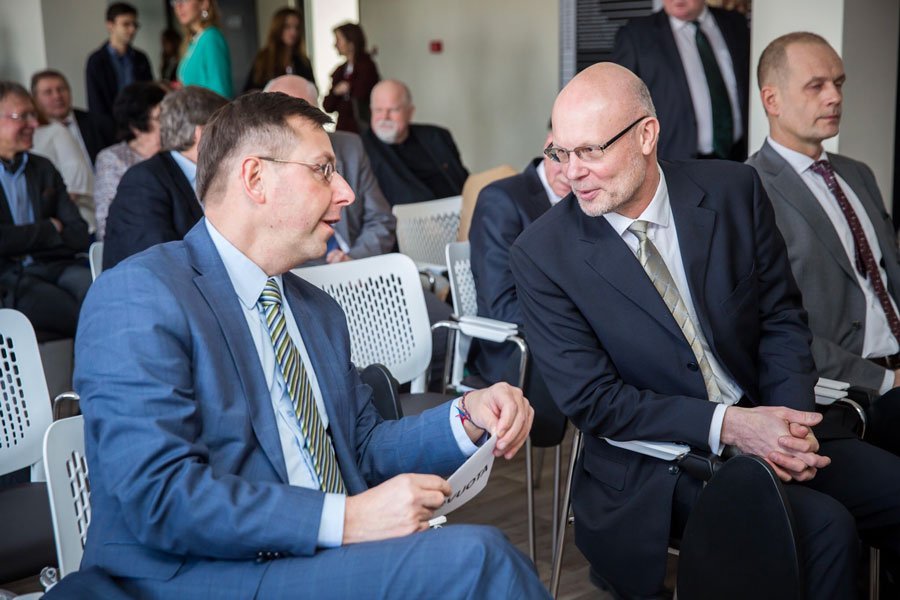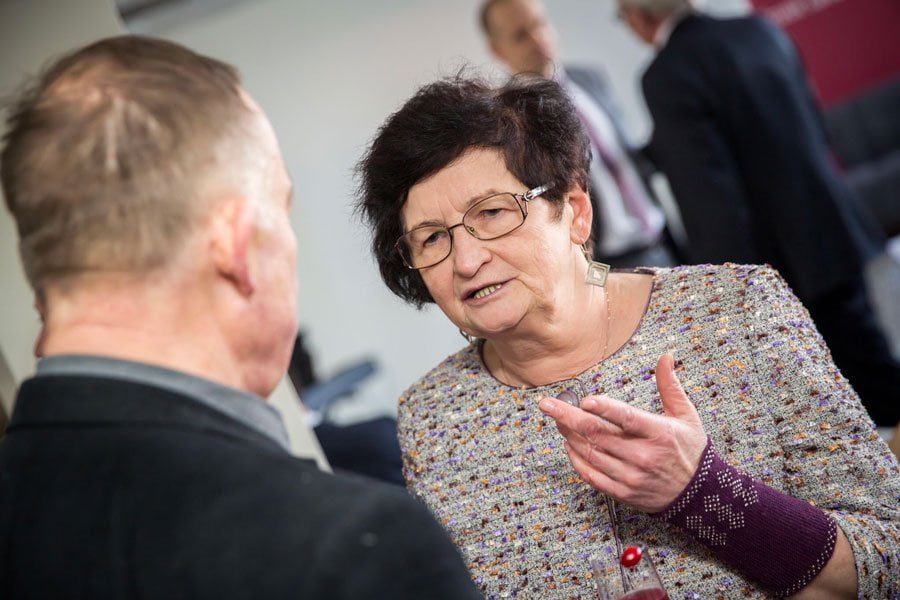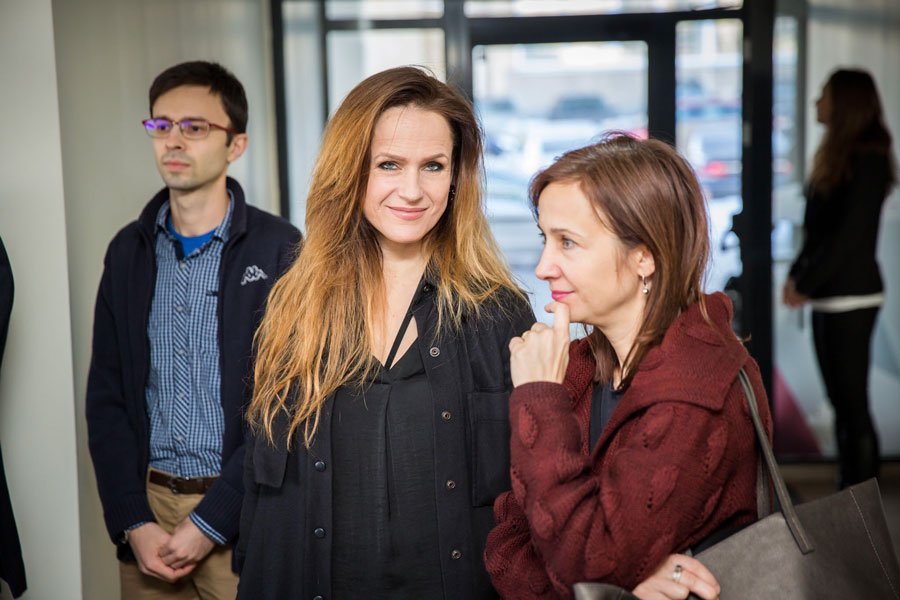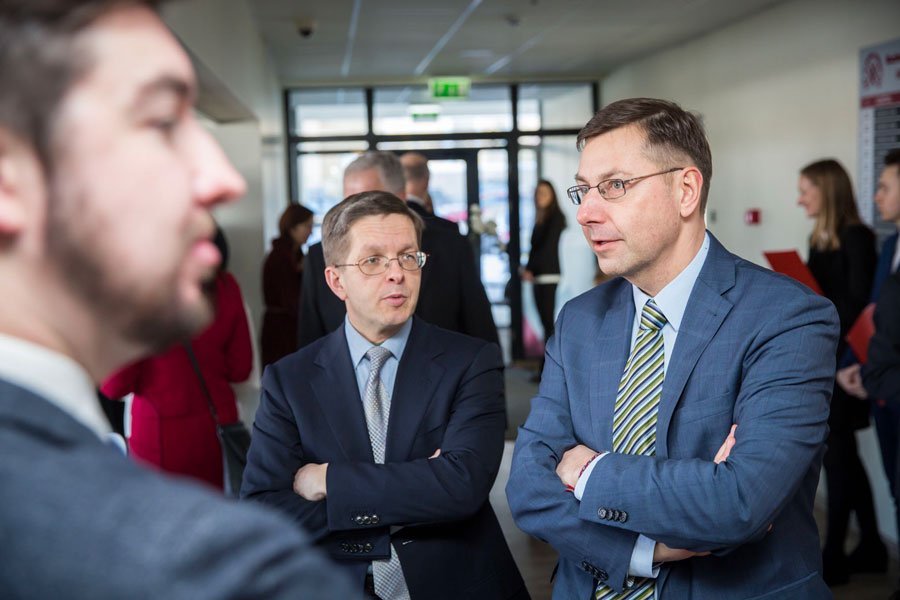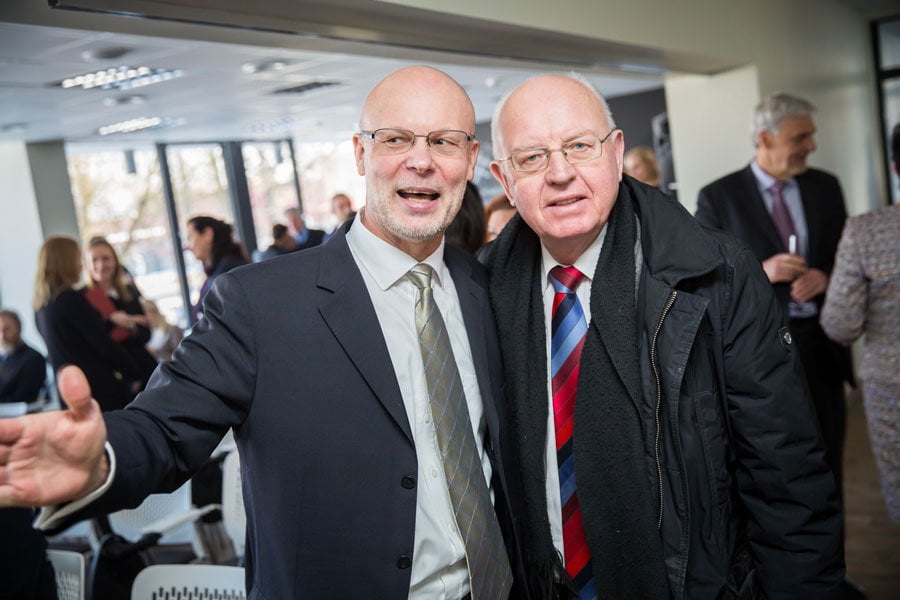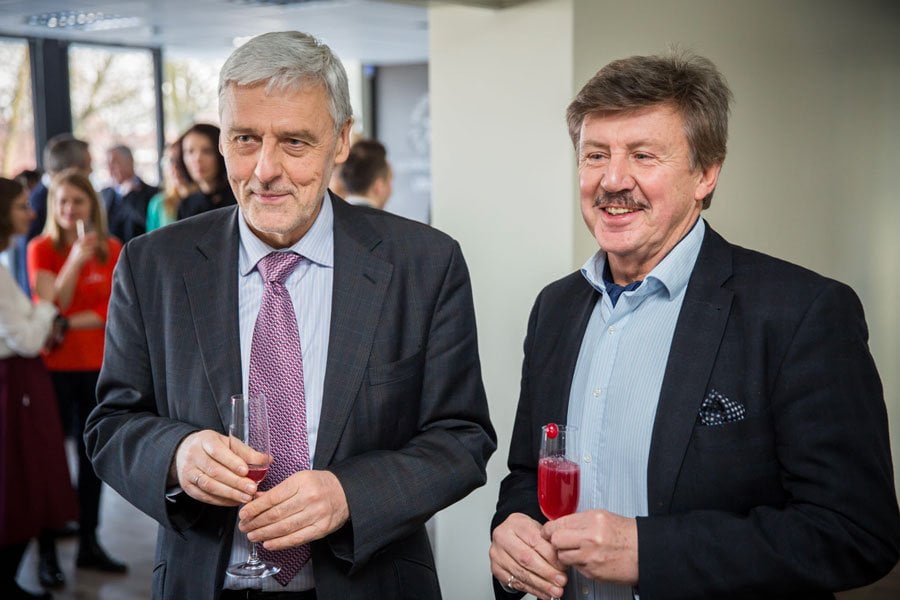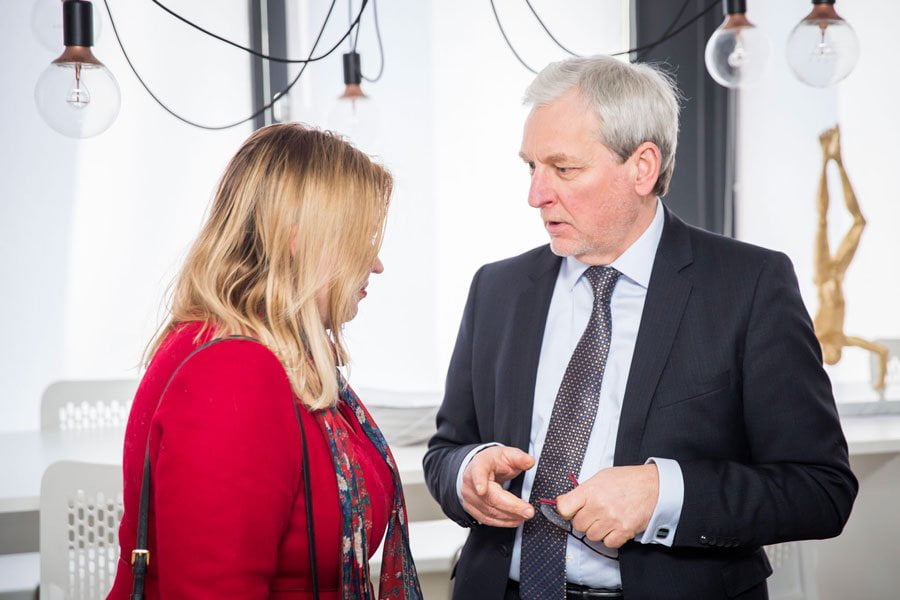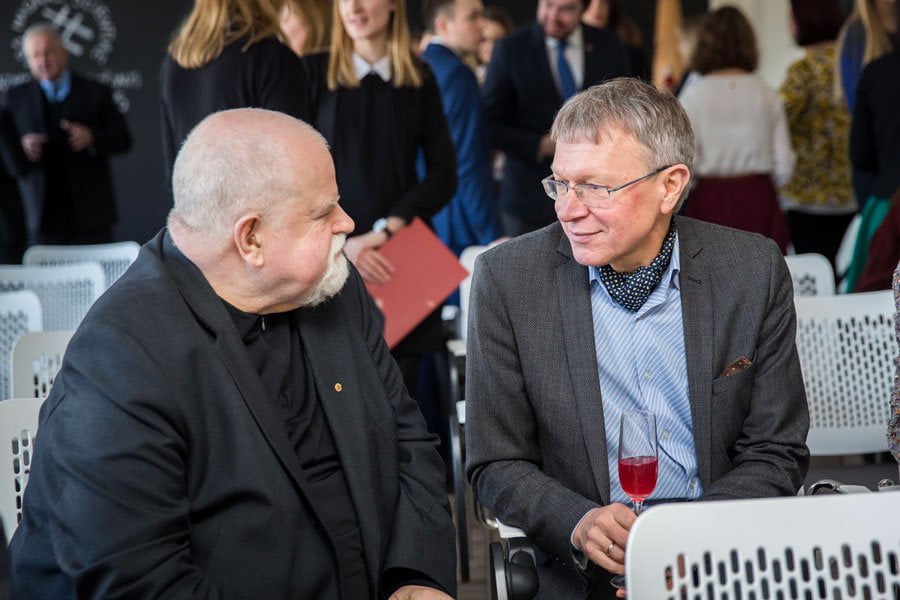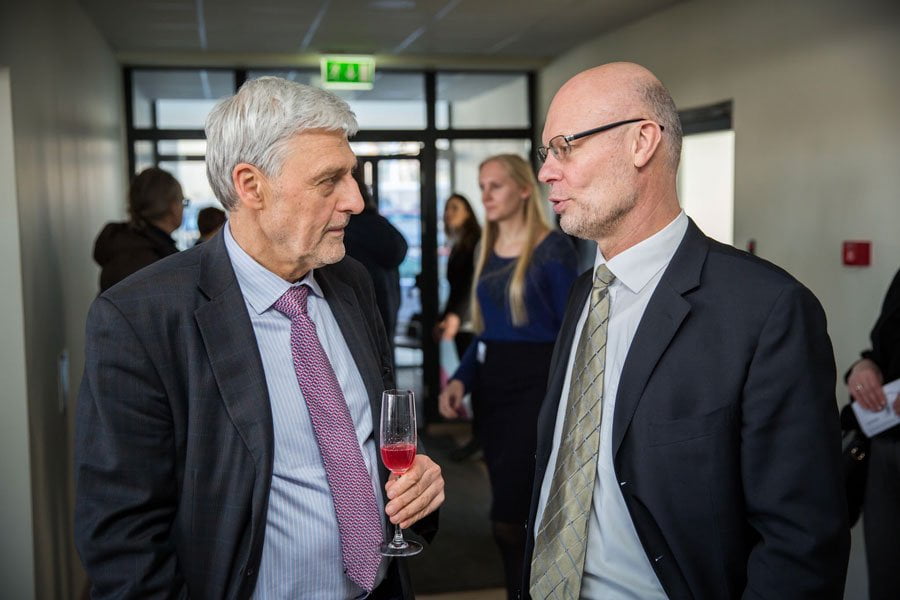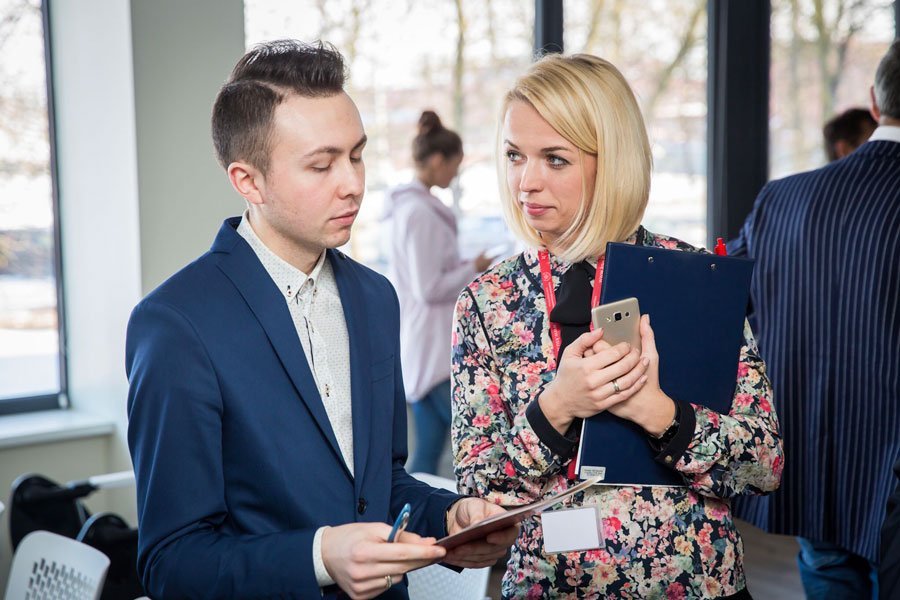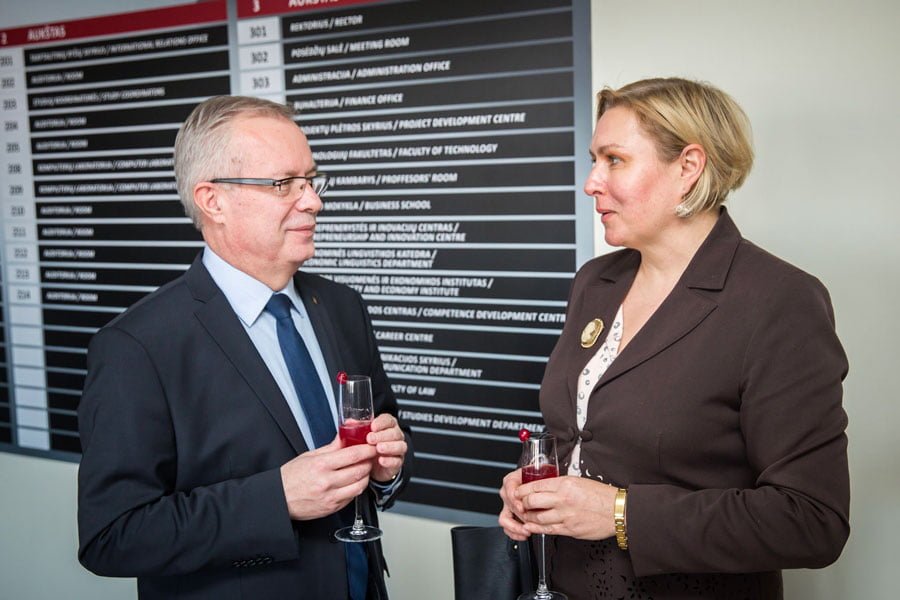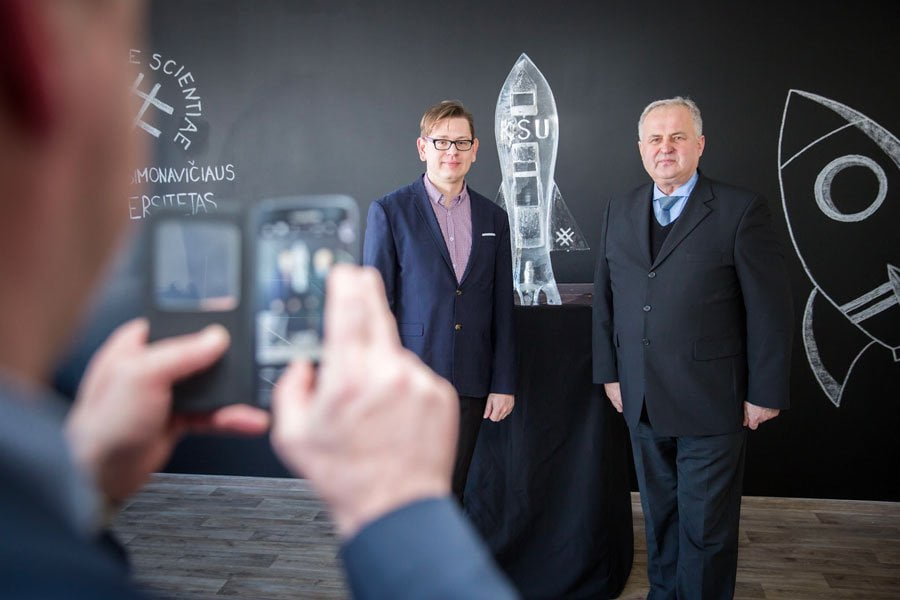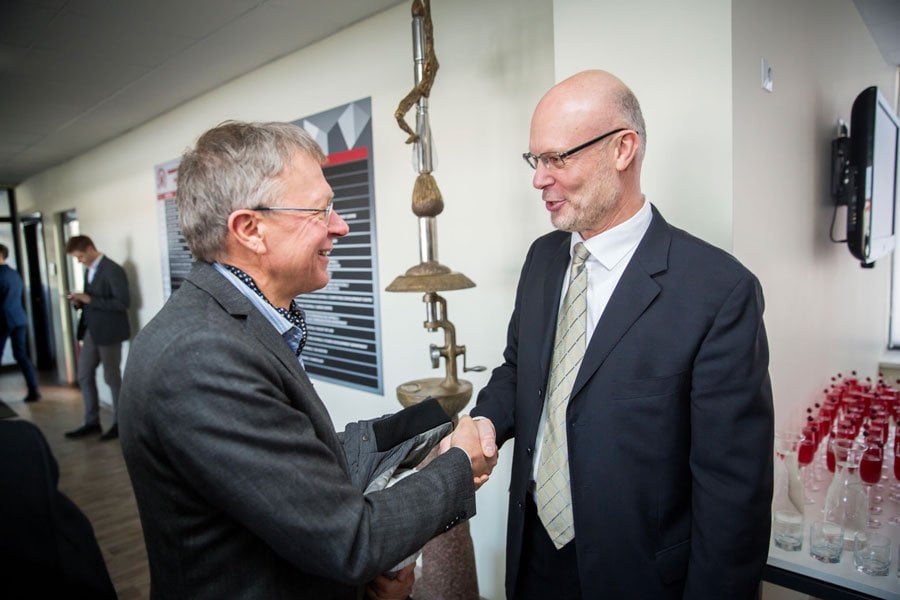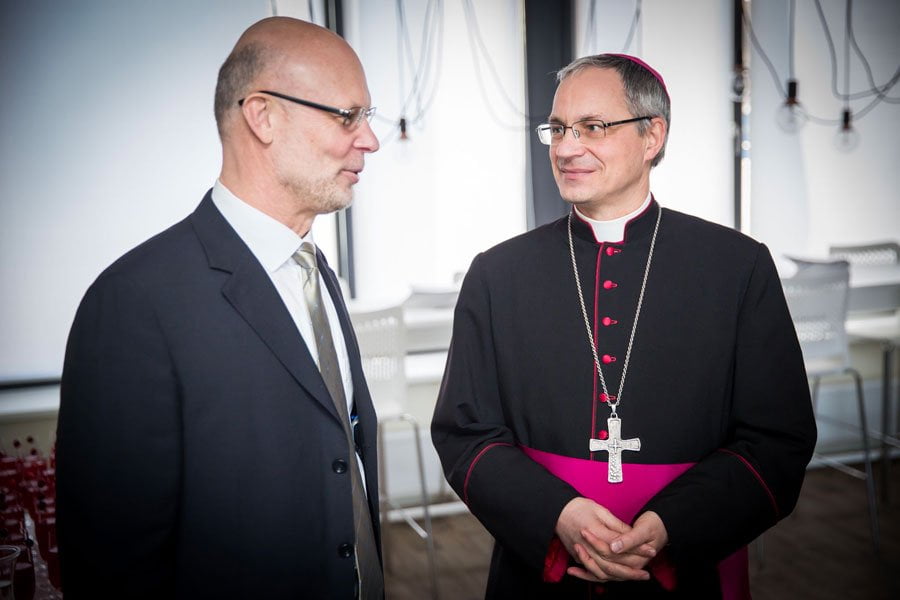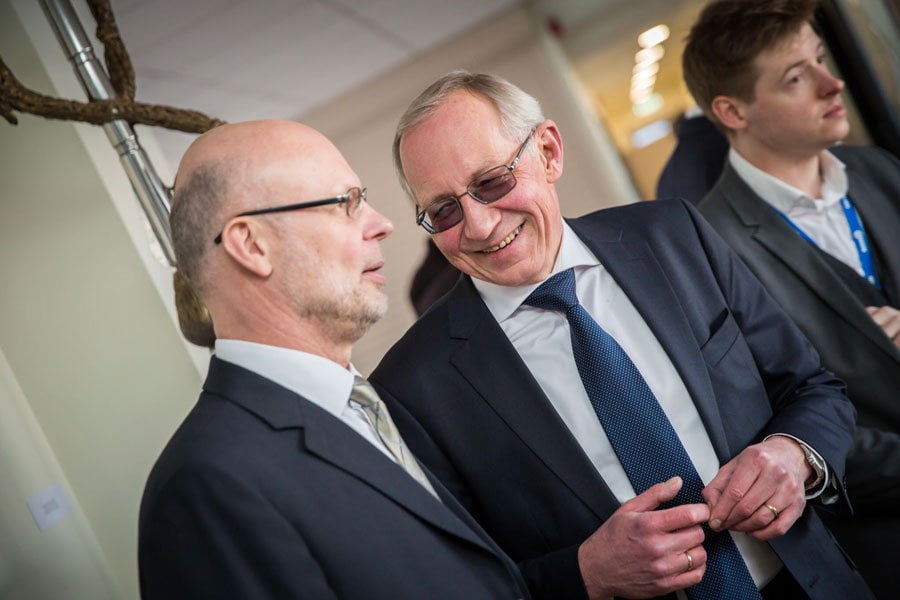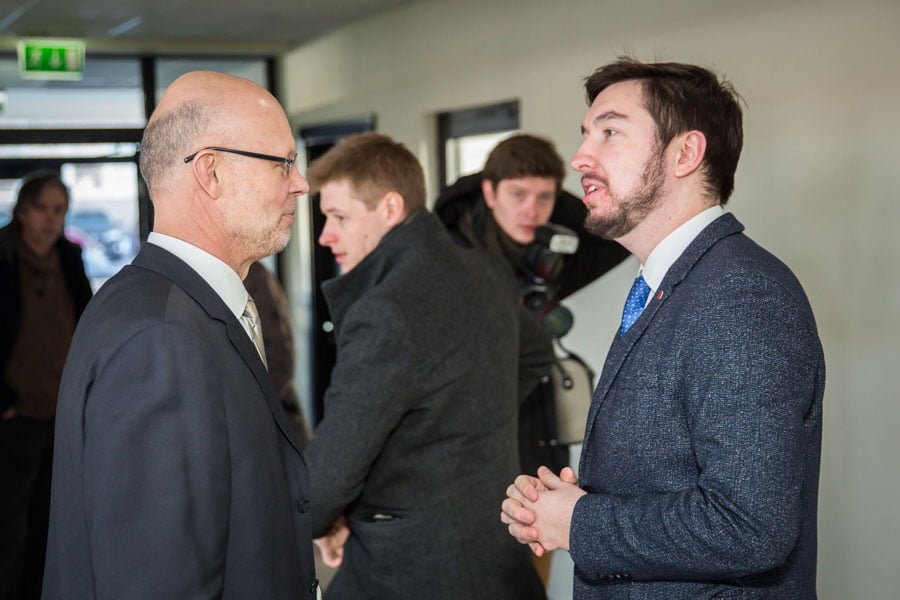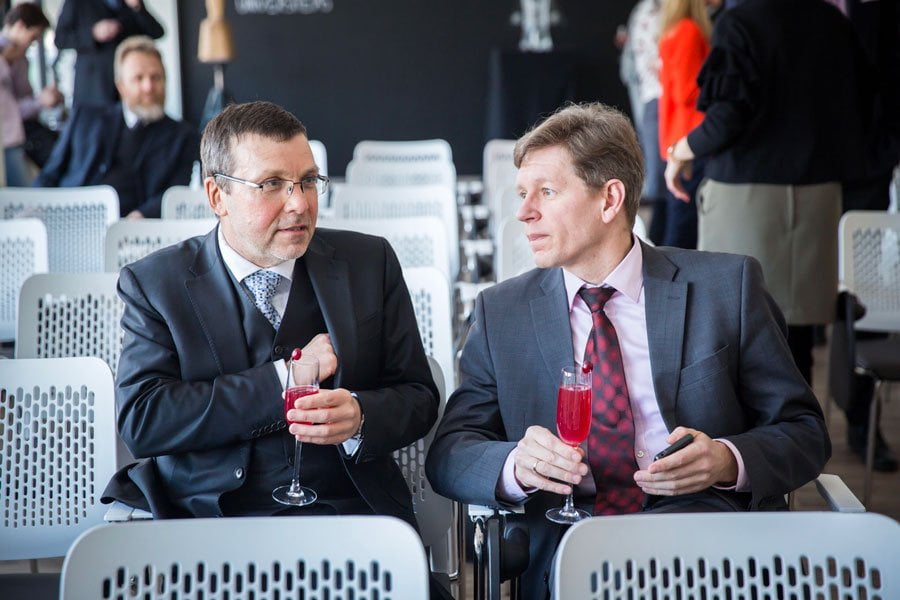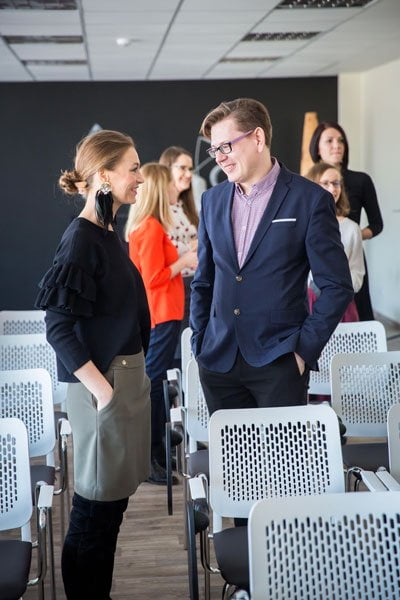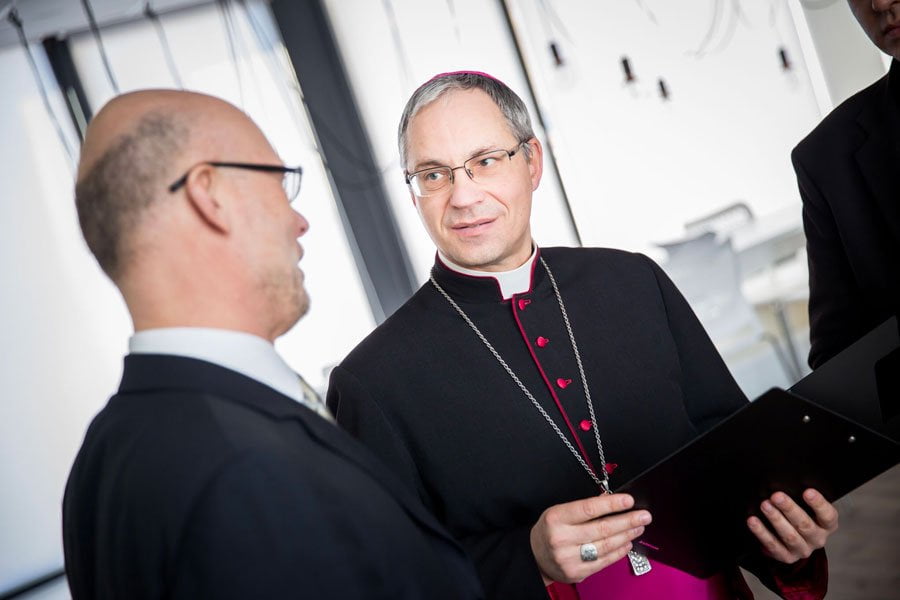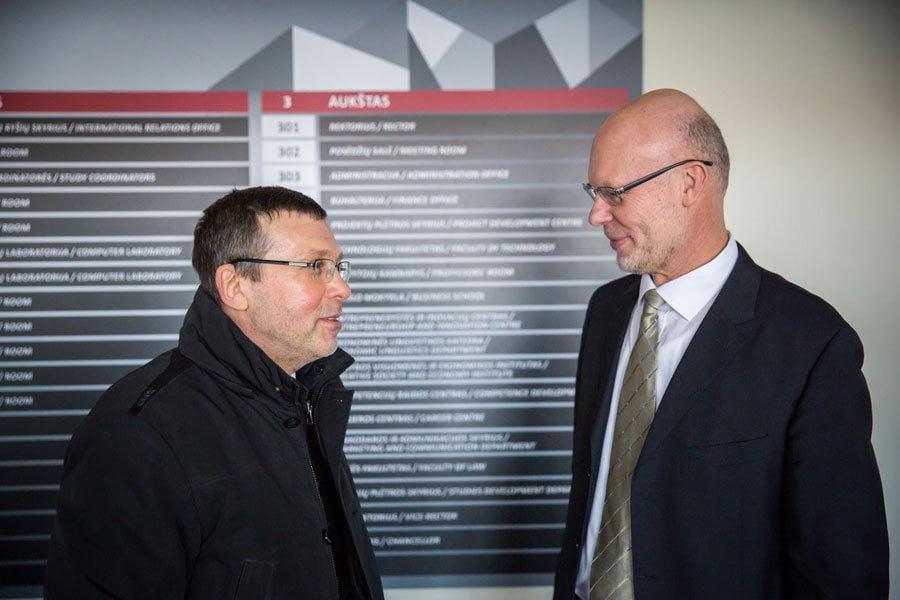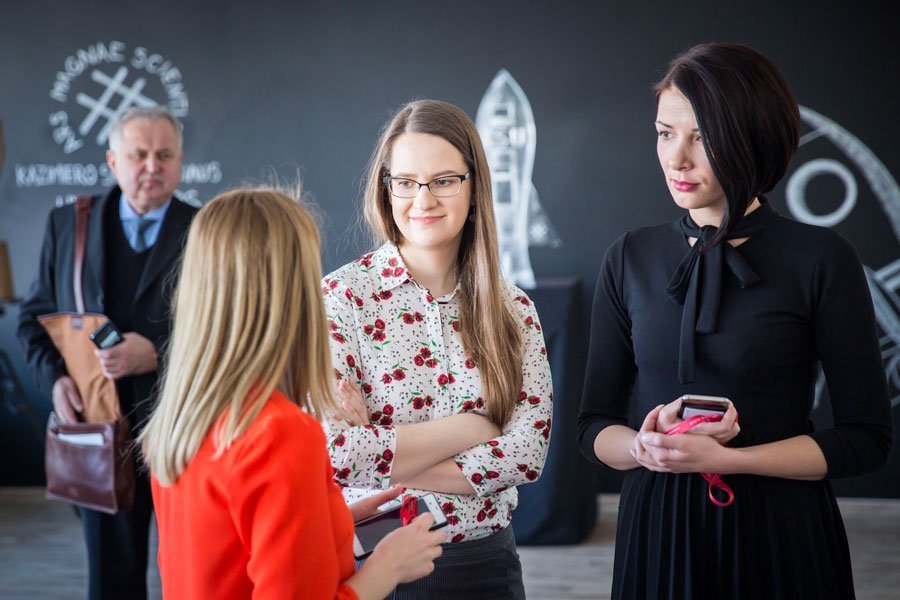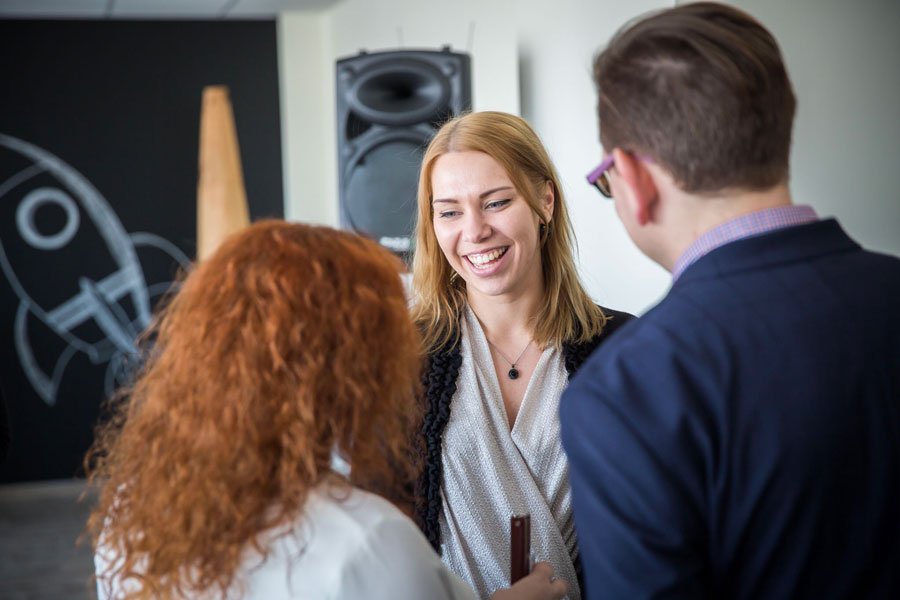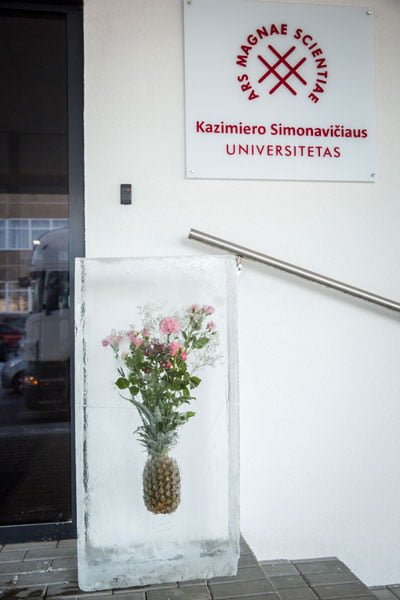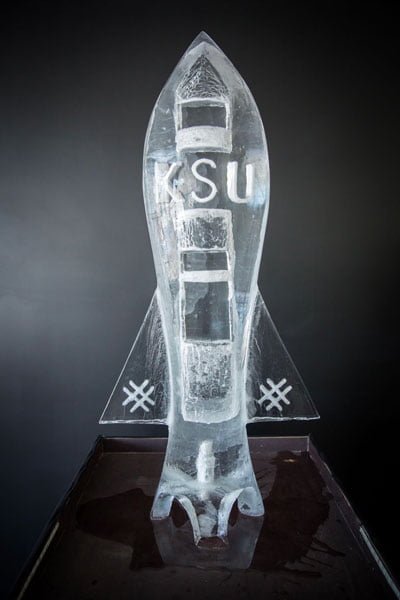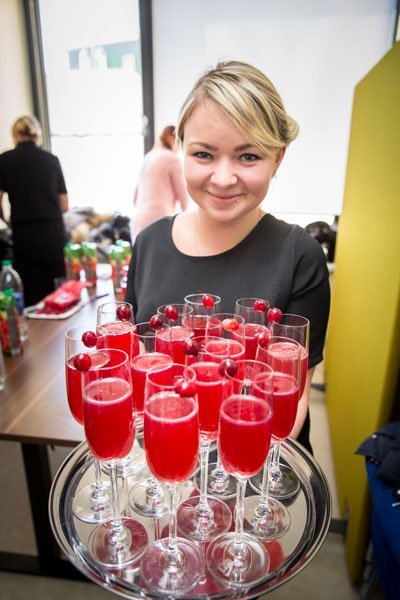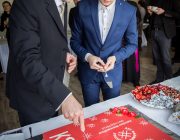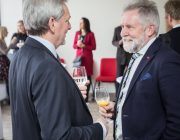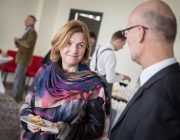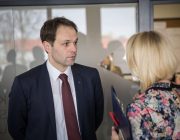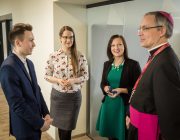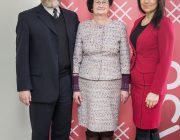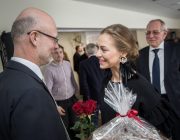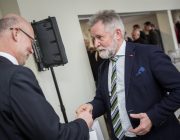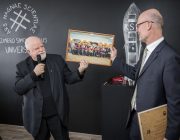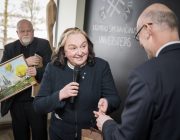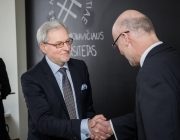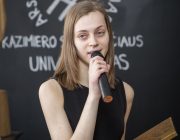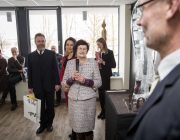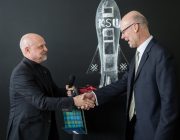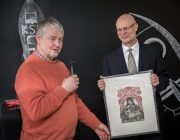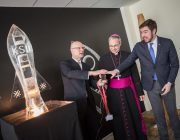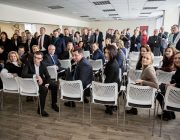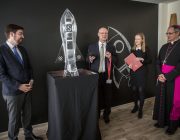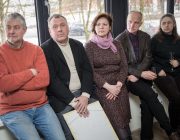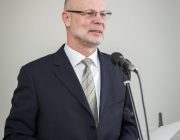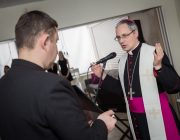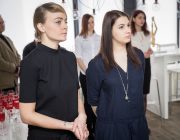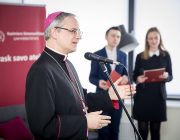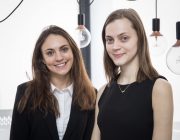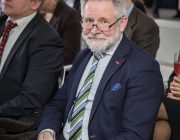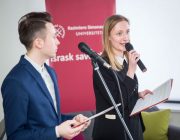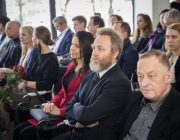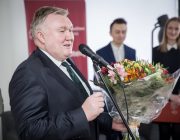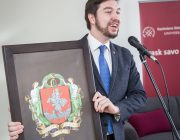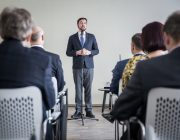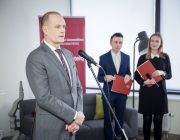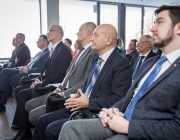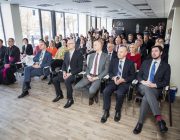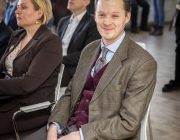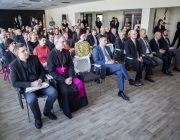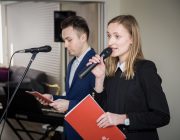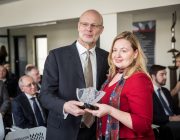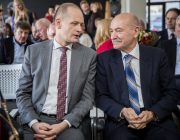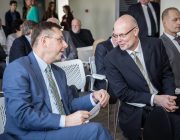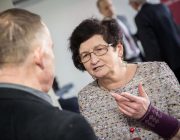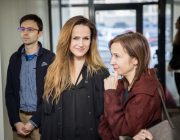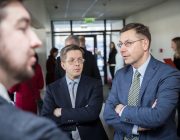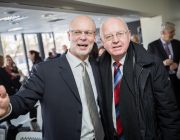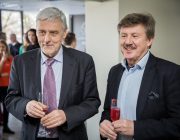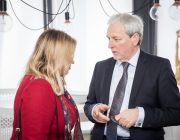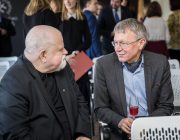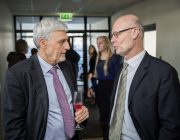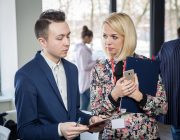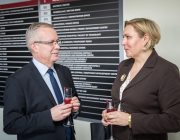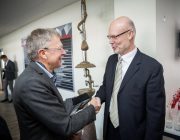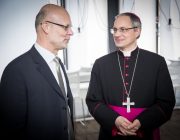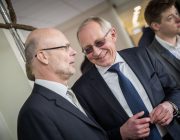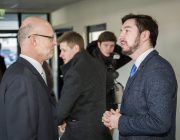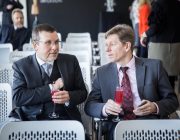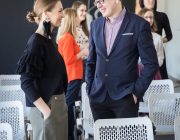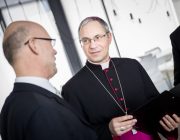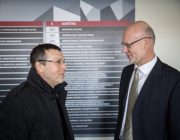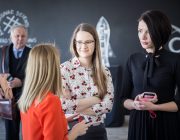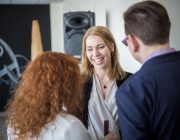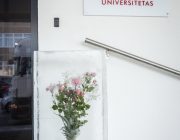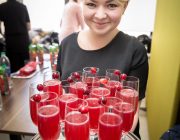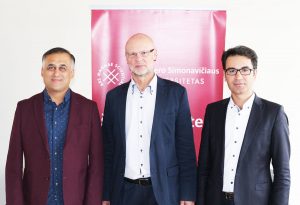
Dr. Necmi Uyanik, Prof. Dr. Arūnas Augustinaitis and Assoc. Prof. Dr. Muhammet Erbay
Representatives from Selçuk University (Turkey), dean of Tourism Department Assoc. Prof. Dr. Muhammet Erbay, and professor at the Faculty of Letters, Department of History Dr. Necmi Uyanik visited Kazimieras Simonavičius University to discuss the cooperation opportunities with KSU rector Arūnas Augustinaitis.
Selçuk University has recently established new department of Civil Aviation Management and chose KSU as the prospective partner to develop joint degree programme and strengthen its‘ ties to Lithuania.
At the meeting, KSU rector and guests also discussed the development of Turkish culture in the Baltic region. Assoc. Prof. Dr. Muhammet Erbay shared his experience gained while studying in Lithuania.
KSU Brunch
This year on the 1st of September lecturers, administrative staff and KSU students meet for the KSU Brunch!
University’s community will celebrate the new academic year in the informal settings, listening to live music, engaging in relaxing conversations, and activities. “Less official speeches, more interaction” – has become the motto of the 1st September festivities at KSU.
For the first time Kazimieras Simonavičius University celebrates the start of the academic year in it’s new premises. The event will take place at 21 Dariaus ir Girėno St., Vilnius and start at 11 AM on the 1st of September, 2017. Organisers invite you to arrive 10-15 minutes earlier.
Snacks and beverages will be served to all Participants of KSU Brunch, but registration is obligatory. To register fill in this registration form.
After the Brunch, KSU Student Association invites all KSU students and graduates to participate in the after party “Duzgės”! More information on the party will be provided during the Brunch.
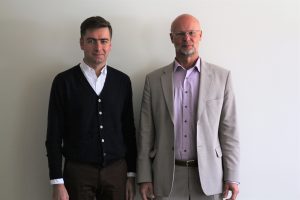
Laimonas Talat-Kelpša and Prof. Dr. Arūnas Augustinaitis
On July 5, Laimonas Talat-Kelpša, the Ambassador of the Republic of Lithuania to India, and his wife Alina visited Kazimieras Simonavičius University (KSU). Ambassador together with the Rector of KSU Prof. Dr. Arūnas Augustinaitis, Chancellor Darius Verbyla, Prof. Dr. Jolanta Zabarskaitė and International Relations Coordinator Dr. Javed Imran discussed the situation of the foreigners who come to study in Lithuania and the problems they face, were looking for solutions that can facilitate the arrival and establishment of foreign students in Lithuania.
KSU Rector Prof. Dr. Arūnas Augustinaitis states: “At present, the University is going through a qualitatively new stage of internationalization. One of the most important areas for international cooperation is India, Pakistan, Bangladesh, Sri Lanka, Nepal – the main countries of the Indostan region. Kazimieras Simonavičius University seeks not only to attract more foreign students, but also to implement talent attraction and international research projects.
It is very important to discuss and find the solutions to the problems faced by foreign citizens wishing to study in Lithuania. Students from India, Sri Lanka and other countries are already studying at Kazimieras Simonavičius University, so we know how difficult is the processes of getting the visa and other travel documents. It is great that we were able to discuss these issues and the possible solutions together with the Lithuanian Ambassador to India. We also discussed opportunities for cooperation with South Asian universities, especially in the scientific and cultural fields.”
10 Kazimieras Simonavičius University students can participate in the Intensive Course “Organisation and Individual Security” for free. The course will take place in Turiba University (Latvia) on August 14-25th.
About the course:
In recent years security issues has become important also to Baltic and Nordic countries. World is coping such challenges as migration, conflicts based on different cultural backgrounds, cyber-attacks and other new challenges. This leads to fact that there is need for high quality training for young security specialists. Those specialists need knowledge and skills not only in subjects traditionally known as necessary for Security specialist, but also be able to manage the team and stress situations, be good intercultural communication specialist and cope with cyber-security challenges.
The course comprises theoretical programme, seminars as well as a set of interesting intensive practical lessons. During the two week course students will gain also practical knowledge in person’s and organisation’s security. Student will gain knowledge of assessment of security tactics for guarded sites, basics of tactical planning and implementation methods for threat prevention and their legal regulation; comprehensive knowledge of facts, theory and correlations necessary for carrying out work related tasks, personal growth and development, public participation and social integration.
Main topics of the course:
- Basics of Security;
- Security theory; Security psychology;
- Security of Individuals. Object Security Concept and Technical Solutions;
- Practical personnel management – Team work and practical tasks. Self-Defence –theory and practice;
- Stress Management in Crisis Situations;
- Globalization and Intercultural communication;
- Team-building and social activities;
- Cyber-security. Data protection Law;
- Copyrights;
- Crime Prevention and Detection Features.
3 ECTS credits will be awarded for the completed course. Organizers will cover the project travel costs (bus tickets for Lithuanian students), pick-up service, accommodation, also catering, study visits, some free time activities. Course will be in English, so students must have knowledge of English.
If you want to participate, please fill in the application form and send it to KSU International Coordinator Vaiva Poškaitė-Tomaševič (international@ksu.lt) until June 21 .
More information: ABOUT NORDPLUS Intensive Course
Application form: APPLICATION FORM FOR STUDENTS
Partners:
Turiba University, Latvia
Kazimieras Simonavicius University
Turku School of Economics – BRDC, Finland

Kazimieras Simonavičius University
On the 25th of April, the agreement on institutional cooperation among Kazimieras Simonavičius University (KSU, Lithuania), University of Nicosia (UNIC, Cyprus) and Yaroslav Mudryi National Law University (NLU, Ukraine) within the framework of master programmes was signed. Students of these universities will be able to gain Master degree from three Universities within 2 years study period.
Yaroslav Mudryi National Law University was established in 19th century and is a leading university in Ukraine in the field of Law. It has more than 23 thousands of students.
University of Nicosia is the biggest university in Cyprus and has more than 11 thousands of students from over than 70 countries. School of Law of University of Nicosia has more than 20 years of experience in the provision of a top-tier legal education.
According to the signed agreement, universities will cooperate leading to the following post-graduate degrees: an MA degree in Law and Politics in the European Union (UNic), LL.M. in European Union Law and Global Challenges (KSU) and a Master degree in International Public Law (NLU).
1 study – 3 diplomas
The students of KSU’ LL.M. European Union Law and Global Challenges study programme have the possibility to be awarded Master degree from three Universities within 2 years:
- MA degrees in Law and Politics in the EU (University of Nicosia)
- Master in Law in the following specialization: European Union Law and global challenges (Kazimieras Simonavičius University)
- Master in International Public Law (Yaroslav Mudryi National Law University)
Students of KSU LL.M. European Union Law and Global Challenges study programme may choose to study:
- Only at Kazimieras Simonavičius University
- At Kazimieras Simonavičius University and at 1 of KSU partners’ universities (University of Nicosia or Yaroslav Mudryi National Law University)
- At all of three universities (Kazimieras Simonavičius University, University of Nicosia and Yaroslav Mudryi National Law University)
Students have to study at least one semester at the universities they choose.
Please, note that University of Nicosia provides online studies so students do not have to go to Cyprus to study and may stay in their homeland country.
International study model – unique and flexible
KSU Law faculty’s dean dr. Aida Kišūnaitė says “For lawyers it is very important to have a wide network of contacts. This international study programme allows to expand students network in three countries! It increases employment possibilities in the international context.
It is also important to notice that this study programme is very flexible: the student is free to choose not only the partners’ university and semester in which he/she wants to study there, but also the study subjects.
This integrated study model is very convenient from time and financial perspectives: instead of three different studies, which would last for 6 years, a student studies only 2 years. It also widens the horizons of knowledge because three different Law study programmes are integrated. Upon the completion of the studies, the student is awarded three separate diplomas from each partner university”.
Duration: 2 years (1,5 years for those who choose to study only at KSU or at KSU and the University of Nicosia).
Language: English
Degrees: Master in Law (Kazimieras Simonavičius University), Master in Law and Politics in EU (University of Nicosia) and Master in International Public Law (Yaroslav Mudryi National Law University)
For more information please contact: dr. Aida Kišūnaitė (e-mail: aida.kisunaite@ksu.lt, tel. nr. +370 5 213 5172).
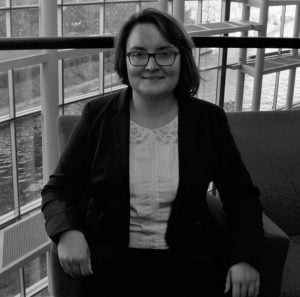 On April 12th 14.20 p.m. lecturer Katarzyna Kamińska from Kujawy and Pomorze University (Bydgoszcz, Poland) will held a lecture at Kazimieras Simonavičius University (212 auditorium). The topic of the lecture is “Social market economy as a model for economic order in the EU”.
On April 12th 14.20 p.m. lecturer Katarzyna Kamińska from Kujawy and Pomorze University (Bydgoszcz, Poland) will held a lecture at Kazimieras Simonavičius University (212 auditorium). The topic of the lecture is “Social market economy as a model for economic order in the EU”.
The lecture deals with the concept and the German model of the social market economy and its importance as a model for shaping the economic order of the European Union. The lecture focuses on three main issues: the problem of the definition of a social market economy, the discussion of ordoliberal theory as its theoretical background, and the implementation of this concept in the European Union. The aim of the lecture is to determine the influence of theoretical foundations of the model of a social market economy on the development of the European Union and its selected institutions.
We kindly invite you to participate! The lecture is open for all students.
On April 13th at 5 p.m. the film of directors Chris Temple and Zach Ingrasci, called “Salam Neighbor” (2015) will be showed at Kazimieras Simonavičius University (Ground floor Conference Hall). The film of directors Chris Temple and Zach Ingrasci is presented by U.S. Embassy Vilnius and the American Film Diplomacy Programme American Film Showcase. The Cultural Affairs Assistant of U.S. Embassy Vilnius Jūratė Kirvaitienė will participate in the event and present the film. We kindly invite you to participate!
The film speaks on worldwide crisis of Syrian refugees. Young Americans come to Jordan and settle in refugees’ camp together with thousands of Syrians who are forced to leave their families due to the war that happens in their country. Directors become the witnesses of extraordinary courage, resolve and creativity when living among people who try to start their lives anew.
The event is free of charge and open for everyone who wants to participate. The REGISTRATION is mandatory. You will find the registration form here.
You can watch the film trailer here:
More information about the film and its authors you can find here.
The language of the film is English. Lithuanian subtitles will be included.
About the film:
Two Americans come to Jordan to Zaatari refugees camp which is situated only 10 kilometers from the border of Syria. They seek to know what it feels like to live together with 85 thousands of Syrians who left their motherland. Zach and Chris go to the epicenter of a crisis. They are two of the first cinema creators who come there, get the United Nations permission to live in a camp as refugees. They register and get the tent. Here Zach and Chris hears the staggering stories of people who fight with their problems, try to recreate broken lives of their selves and their neighbors – from Um Ali, the women who hardly overcomes loss and cultural barriers to the 10 years old Raouf who hides his problems behind the never disappearing smile.
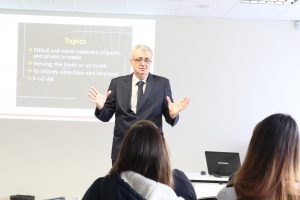
Assoc. Prof. Dr. Sabahudin Hadžialić
Assoc. Prof. Dr. Sabahudin Hadžialić is a professor at the Faculty of Media and Communications of International University Travnik (IUT). In the framework of the Erasmus + mobility, professor held a series of lectures on intercultural communication at KSU. Our conversation spins about communication, different cultures and countries.
What role does the communication itself play in a modern world?
Some politicians, economists and media people would like to say that their profession is the best in the world. What they say is the most common thing and everybody should obey that. The thing is that they forget interdisciplinarity of the meaning. It means that all of them should interact. That is a communication form. Communication means interaction. Interaction means understanding. Understanding means consensualism and consensualism means peace.
How did you take an interest in the intercultural communication?
Intercultural communication is a prerogative. Prerogative that means assumption of precondition of everything. To understand each other, first we have to communicate. Especially if we deal with foreign people, we have to know what intercultural means. Intercultural means that my freedom to communicate will stop on a point when my freedom hurts somebody else. Intercultural communication is a precondition for everything.
What are the most important things we should know when working with people from different culture?
First, we have to ask ourselves some questions like what I would like to accept from them and what I do not want to accept. The future is in mutual understanding, finding consensual formula that we are all humans and we are all red under our skin. I usually say that nation is a part of the history. We just need to wait for the end of the history.
How cultures are divided? Could you give us an example?
There are 10 different points for that: social background, culture, education, tradition, religion, population issue, gender issue, stereotypes, even ecology etc. There is nothing better than differences in the cultures. It unifies us. You and people from other culture may disagree about something. However, when you go back and think about it, you might find some their ideas that might be interesting and they may rethink of something yours. For example, I did my homework and I found the information that people of Lithuania are the less empathic people in the world. It was a research done. However, I found all the people that I met here to be more than that! They are so friendly and open.
Culture itself is a precondition for everything in the society. Do you know that 10 percent of earnings got from bread sales in Sweden are invested into culture? Swedish know that people with developed cultural and media literacy will be developed in a sense of better human beings and they will interact with others. That is the future. That is why I always say that religion must be love within the culture. By that, we will approve ourselves and have interdisciplinary approach.
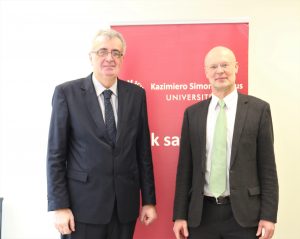
Assoc. Prof. Dr. Sabahudin Hadžialić and KSU Rector Prof. Dr. Arūnas Augustinaitis
Do you have any insights about Lithuanian culture during your visit here?
Yes, it is not my first visit here. When talking with students, I found out that you are so open. I did some research on the streets. I knew some things but I asked if passers-by could help me. Everybody was so helpful and very open! If you said “ačiū” in my country, I would say “bless you”, but in your country it means “thank you”. Those differences between cultures are so inspiring!
Do notice any differences or similarities between people in Lithuania and Bosnia and Hercegovina?
First, I would say that differences by the area does not exist. Despite the fact that we are in the south and have high mountains. You are high on the earth but you are not on the high level above the sea. For example, Sarajevo is about 700 meters above the sea level. It is general in Bosnia, except south part Hercegovina. People in Bosnia and Hercegovina eat less meat than you here. These are just the small differences. Despite that, we are all the same and we are all humans.
The differences between cultures for me are the advantages.
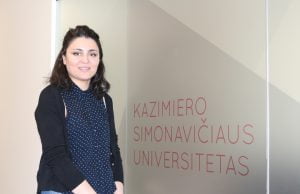
Rusudan Chachanidze
This semester Rusudan Chachanidze who teaches Strategic Management and Financial and Management Accounting at Caucasus University and University of Georgia, is a guest lecturer at Kazimieras Simonavičius University. We talk about the role of Strategic Management in a modern world, the education of Georgia and her impression on Vilnius and KSU.
How did you take an interest in strategic management?
Strategic Management is kind of a subject that has no special faculty for it. Therefore, it takes a lot of different knowledge to combine somehow. Firstly, on my BBA, I used to study marketing, then I switched to Finance and my PhD I am doing is on financial frauds. I had all general knowledge that helped me to go to the strategic management. It requires some knowledge of management, finance and marketing so that is why I decided to combine everything.
Why strategic management is important in a modern world?
Environment is very dynamic right now. Businesses and industries move very fast and change very fast so if you do not have proper tools to plan well, it is very hard to succeed. Although it does not work like you make a plan and it prevents you from changes. Furthermore, strategic management is more focused on being flexible and quickly respond to changes. I think it is a very important skill for each student who will go for having their own businesses or working in a big corporation. This planning skill, having this conceptual view and seeing things in a big picture is a very important capability if you want to succeed in business.
Is strategic management just about business or also public sector?
It is very relevant to both public sector and non-profit sector, so it is not only for businesses. Of course, planning is for everyone and it does not matter what you do, you need to plan things properly.
Do you have any insights about strategic management appliance in Europe and Georgia? Do businesses and governments understand the importance of it?
I think mostly big corporations do that. Every big corporation has its strategic management team and proper planning. Small corporations sometimes do not understand the importance of it. I try to bring to small companies and entrepreneurs the idea that it is important to have strategy even if you are small. I work with cases and I show how each of the theory that I’m teaching them is applied, I show the real life examples of big and small companies and start-ups, so they could see how useful it can be and how these tools are used to actually succeed.
Could you tell us more about Georgia education system? What role do the private universities play in Georgia?
In Georgia, we have many private and public universities. Before the reform, which was started I think in 2005 or 2006, government funding would only go to the public universities. Study quality at public university was not very high but private universities were good. Somehow, the government wanted public universities to keep up with the private ones. Therefore, government started this reform to create intense competition among public and private universities.
The voucher system was introduced. That means that money is given only to a student now. Public universities do not get any funding from government unless they attract students. If public university offers low quality education, students do not go there because they can bring their vouchers and money to private universities. In my opinion that helped a bit. Now we have at least one big public university, which has high quality education. And it is because of the competition. It’s all about student now.
In Lithuania the system is very similar. The difference is just mostly you can bring that public money only to a public university.
Well, it is the most important difference! Public universities has actually compete for money. They had to focus on quality, not only on number of articles or number of professors. Students do not care about that. All they want is to get a proper education and then find a job. Number of articles will not find you a job. That is why they have to increase the quality of education.
Tell us more about the University you came from.
Caucasus University is the university where I started my BBA (Bachelor of Business Administration); actually, this is my home university. It was one of the first private universities in Georgia, which had a very high quality studies and still has a very good reputation. It is a small university. Ant the other one is one of the biggest private universities in Georgia. They both are private and very successful. For example, Caucasus University still has a reputation that graduates of it can overcome any challenge. It is because it was very difficult to study there. I think time that I spent there has really helped me get more confidence and believe in myself, just believe that I can do anything I want. If you can survive 4 years there, you can survive anything! (Laughing)
What about students here in Lithuania and in Georgia? Do you notice any difference between Lithuanian and Georgian students?
Actually, no. Students have the same values and they are friendly. I like your students because they are so welcoming, friendly and very smart students as well. Sometimes after lectures, they invite me to hang out with them and just to be a part of their lives. They took me to the places where they usually go. And I really like being with them! It helps to know the culture better because when you come to a country just for two weeks and you do not have any friends here it is not easy to get into the culture. However, if you have someone who just take you to the places where they go and you get involved in their everyday life you understand the culture better. Everyone is very friendly here!
What is your impression about KSU?
Oh, I like your university very much! First time I visited it last year in summer on a workshop. I liked it so much! Well, I also liked the city. It was summer, sunny all the time. People I met from the administration were very nice. I was very glad to get this offer because I really wanted to come back here. It is so interesting to be here. Now you have this new building and you are growing so I am very glad to see your success.
Will you come back soon here in KSU?
I really hope that. I would like to have a chance to come back here!
On February 22-23 the international workshop „Towards Data Economy Excellence Centre and Big Data Lab“ took place at Kazimieras Simonavičius University. Prof. Dr. Jari Kaivo-Oja (Finland) moderated the workshop.
Experts from various countries talked about the Data Economy and Big Data:
- Dr. Jari Kaivo-Oja (University of Turku, Research Director of Finland Future Research Centre),
- Dr. Dr. Steffen Roth (La Rochelle Business School),
- Levan Bzhalava (Business School of Caucasus University, Tbilisi, Georgia),
- Dr. Arūnas Augustinaitis (Kazimieras Simonavičius University),
- Lasse Härkönen (Founder, CEO, Future Winners Oy, Finland),
- Darius Verbyla (Director of Business School of Kazimieras Simonavičius University).
Representatives from business and public sector have also participated in the international workshop.
The workshop was aimed to:
– review the latest Data Economy and Big Data techniques, research and utilization trends;
– shape the Data Economy Excellence Centre and international virtual Big Data Lab establishing and operating principles;
– discuss about the joint projects and commercial cooperation opportunities and forms.
KSU Rector Prof. dr. Arūnas Augustinaitis welcomed all gathered and presented the shift from Information Management to Big Data concept. Professor emphasized that Big Data is a quite new concept and it is constantly changing.
Prof. Dr. Jari Kaivo-Oja noted that „The big data revolution it is going to change the way we live, work and think in business and society“.
IT Strategist and Big Data Expert Adomas Svirskas looked at Open Data as a raw resource like crude oil and noted that organizations try to monetize data as a saleable asset. Data Economy fosters innovation, creates jobs and is useful not only to business, but also to public sector.
Adomas Svirskas noted that the aim of Data Economy Excellence Centre is to facilitate and foster advances in Data Economy field. It could operate as a synergy centre and forum to foster dialogue amongst the players of Digital/Data Value Chain.
Potential activities of Centre may include the following:
- Modern Data Science curriculum and study programme for undergraduate and graduate students
- Training centre and tailored programmes for corporate and public sector professionals, attracting leading professionals, innovators and practitioners of this field
- Applied research and innovation through participation in national and international projects, collaboration with industry and the Government
- Showcases, pilots and living labs to experiment and demonstrate value of Data Economy solutions
- Business incubator for datatech start-ups
On February 22th Kazimieras Simonavičius University invites you to participate in the international workshop „Towards Data Economy Excellence Centre and Big Data Lab“.
On February 22th Kazimieras Simonavičius University invites you to participate in the international workshop „Towards Data Economy Excellence Centre and Big Data Lab“.
Data Economy and Big Data role is a new challenge in all areas of modern life, business and management. Data Economy extend, modernize and replace the information management and economic models and paradigms of knowledge, adapting them to the modern business and management for smart logic. Use of Big Data radically changes the planning, forecasting and foresight methodologies.
Big Data studies, research and practical use is one of the most important priorities of the Kazimieras Simonavičius University.
The purposes of the seminar are:
– to review the latest Data Economy and Big Data techniques, research and utilization trends;
– to shape the Data Economy Excellence Centre and international virtual Big Data Lab establishing and operating principles;
– to discuss about the joint projects and commercial cooperation opportunities and forms.
Topics:
1. Introduction to Data Economy Excellency Centre and Lab
2. Big Data – Big Deal – Challenges and Prospects
3. Towards Data Economy Excellence Centre and Big Data Lab
4. Persons, Organizations and Societies in Systemic Big Data Analysis
5. Vinted experience with Big Data
6. Data-Smart City and Industry Solutions
7. Workshop for planning DEE Centre and Big Data Lab (Guidelines for DEE Centre and BD Lab Roadmapping Work)
8. Reporting Findings and Roadmaps for DEE Centre and Big Data Lab, WS leaders
9. Concluding Remarks and Next Roadmap Steps
The discussions will be moderated by:
1. Prof. Dr. Jari Kaivo-Oja (University of Turku, Research Director of Finland Future Research Centre)
2. Prof. Dr. Steffen Roth (La Rochelle Business School)
3. Dr. Levan Bzhalava (Business School of Caucasus University, Tbilisi, Georgia)
4. Prof. Dr. Arūnas Augustinaitis (Kazimieras Simonavičius University)
5. Lasse Härkönen (Founder, CEO, Future Winners Oy, Finland)
6. Darius Verbyla (Director of Business School of Kazimieras Simonavičius University)
More details will be sent before the event.
Please register by email: arunas.augustinaitis@ksu.lt or darius.verbyla@ksu.lt until February 17th.
For more information please contact:
arunas.augustinaitis@ksu.lt, 8686 60890
darius.verbyla@ksu.lt, 8612 78493
Kazimieras Simonavičius University Central Building and 5 years anniversary was held today. The new building (Dariaus ir Girėno st. 21, Vilnius) was symbolically opened with the lightening of the ice sculpture representing a rocket from Kazimieras Simonavičius sketches. Education and Science Vice-Minister Assoc. Prof. Dr. Giedrius Viliūnas, Chairman of Vilnius City Municipality Committee on Culture, Education and Sports Vytautas Mitalas and Auxiliary Bishop Arūnas Poniškaitis participated in the event and gave the greeting speeches.





 On April 12th 14.20 p.m. lecturer Katarzyna Kamińska from Kujawy and Pomorze University (Bydgoszcz, Poland) will held a lecture at Kazimieras Simonavičius University (212 auditorium). The topic of the lecture is “Social market economy as a model for economic order in the EU”.
On April 12th 14.20 p.m. lecturer Katarzyna Kamińska from Kujawy and Pomorze University (Bydgoszcz, Poland) will held a lecture at Kazimieras Simonavičius University (212 auditorium). The topic of the lecture is “Social market economy as a model for economic order in the EU”.


